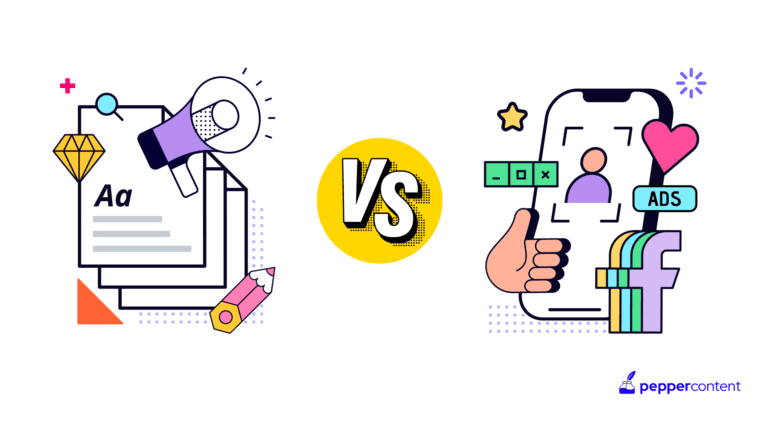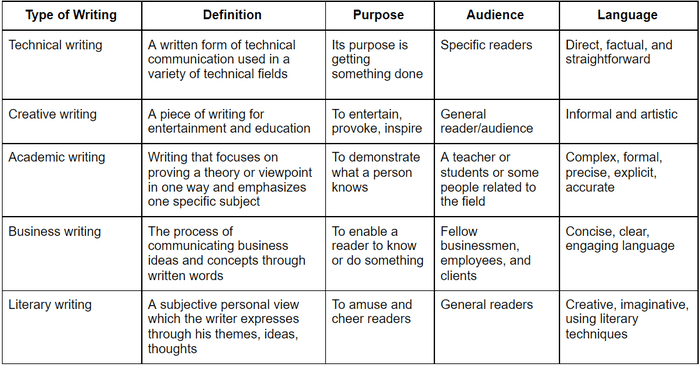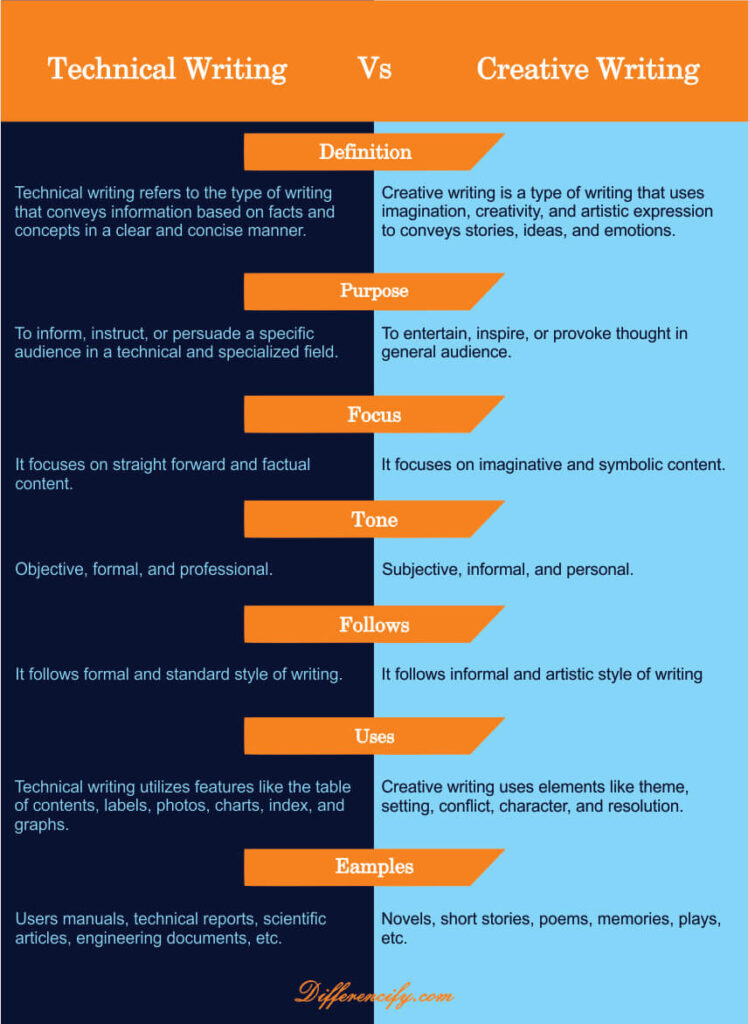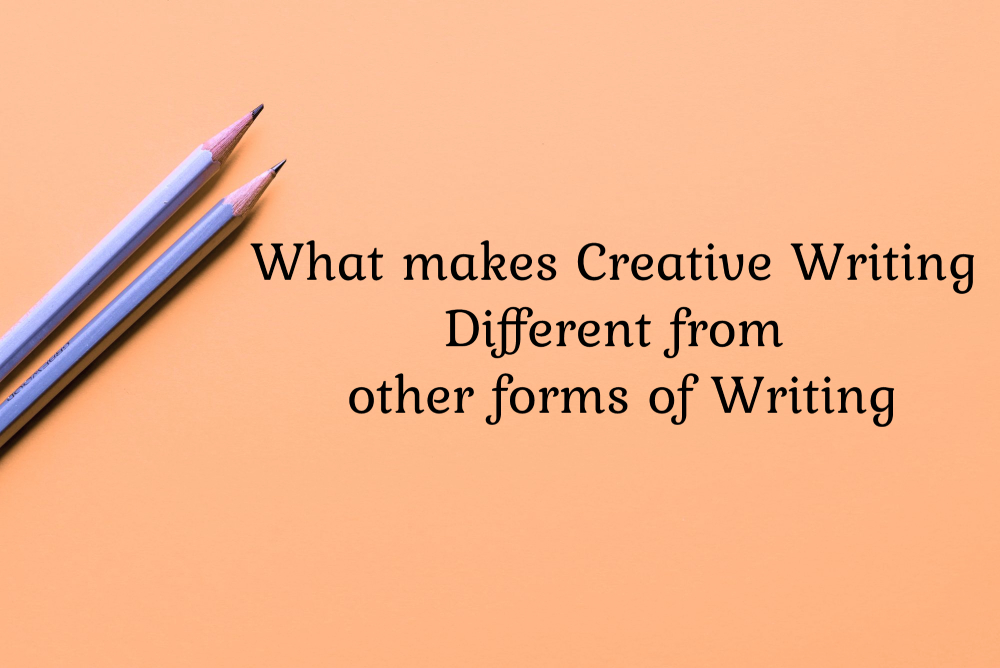
Business Writing Vs. Creative Writing – What You Need To Know
Those who think that business writing and creative writing are the same thing, are sorely mistaken. There is a clear difference between business writing (attempting to make an audience aware of and potentially purchase your product), and writing creatively (for the benefit of someone’s imagination or enjoyment).
While there are pieces of creative writing that may mimic business styles, rarely will you see an example of business writing that imitates creative styles so it’s important to know the differences. Perhaps a more drastic comparison cannot be made than one between business writing and creative writing .
So what are the differences?
Writing For Business:
To conjure up an image of business writing, just think about the last newspaper ad, magazine cover, Super Bowl commercial or even work proposal you looked at. All these different mediums are great examples of writing for business. Their proposal is hopefully enticing, their benefits are clearly stated and the creator intends that it will compel the viewer to say yes to something or make a purchase.
Corporate reports and finely developed marketing material pieces are other good examples of the methods of business writing. It is characterized by the use of formal wording and written in a clear and concise manner. This ensures there will be little room for reader interpretation. The writer only wants to provide facts. This formal tone allows the writer to separate themselves from the content or product allowing it to sell itself. Of course a cordial tone is still necessary to build trust and not alienate the reader.
Business writing pieces relay information as a matter-of-fact. Using a minimalist approach, the writer states what is necessary and little else. Often seen as one-dimensional, business writing dictates information and does not take into account the reader’s experience level. That is not the goal. The goal is to convince a reader to do something using the following dialogue examples:
- “The report clearly states this…”
- “You should really buy that…”
- “Don’t do this…”
- “Do this or else…”
Creative Writing:
Creative writing is the total opposite of business prose. Creative writers often reveal bits and pieces of information to build suspense and intrigue. Their goal is not to sell anything but rather to take a person on a journey far away from everything else.
Instead of being one-dimensional, it offers a two-way relationship between the writer and their audience. Even though the reader is not actually sitting by the author’s side, the writer has the reader’s thoughts and emotions in mind when putting words to paper.
Creative writing is also considered inclusive. It will envelop the reader instead of keeping them at arms-length to state facts. . The use of the writer’s vast lexicon is also a prominent characteristic of creative writing. Using words both familiar and foreign, the writer is able to be more descriptive give the reader a richer experience.
In Conclusion:
Clearly, business writing and creative writing are not the same thing. Business writing is fact based, predictable and usually includes an ask or action at the end. Creative writing, instead, offers writers the ability to use an infinite number of avenues to take their writers on a journey to literally anywhere.
Keep in mind from time to time, the two styles may overlap. The most notable example is Ernest Hemingway. Highly regarded as one of the greatest writers of the twentieth century, He was able to whisks his readers away on a grand journey while keeping the word and sentence count to a marked brevity. This hybrid style of writing demands a great deal of forethought and clarity to from the author so as to not rob the reader of the experience or details.
Of course, not just anyone can be a Hemingway. Most writers today, depending upon their occupation will choose between business and creative styles. Knowing the difference between the two styles can be an important distinction. It is a difference that any advanced writer should keep in mind when presenting their thoughts and ideas to their readers.
Home Based Green Businesses Are Raking In The Green
The five e’s of productivity.
Comments are closed.

Home > Learn More About Creative writing > Business Writing Vs Creative Writing Core Comparision
Business Writing Vs Creative Writing Core Comparision

Free Counselling :
IN +91 9899577620
US +1 2099044506
Table of Contents
What is Writing
Writing is the way of expressing our ideas and thought on a piece of paper. Of course, nowadays writer does it by typing on a computer screen or laptop screen. So, it is the medium of communication. For the learning of any new language there are four skills that we should qualify for:
1. Listening
2. Speaking
4. Writing.
Content Writing Courses with Gold Membership
45-min online masterclass with skill certification on completion
Mentored By Chetan Bhagat
Access Expires in 24Hrs
Register Now for Free

Upcoming Batches of Creative Writing Courses :-
Generally, when we are in the phase of learning our native language, we first listen to it, based on which we started to speak. Then the skill of reading is developed, based on which ultimately the fourth skill writing comes. For knowing of any particular language these skills are underlined ones. These language skills are related to each other with the way of direction of communication and the methods of communication.
Types Of Writing
There are different types of writing from informal to formal types such as:
1. Business and Marketing Writing
2. Technical and Research Writing
3. Creative Writing
4. Academic Writing
Let’s explore more and have some detailed information about Business writing and Creative writing.

About Business Writing
It is the type of writing that provides significant information to the reader. In Business writing, the main aim is to transmit information to a reader. Clear language and concise information are required in Business Writing to help the reader to understand the information written. Business writing is the foundation of any business. In this type of writing, the writer only provides the facts. Formal wording and tone are used in Business writing. And there should be to the point information about any product or services. However cordial tone is necessary to build trust and engagement of readers to the content written. Some main factors to consider in Business writing is:-
1. Information should be accurate, complete, and must be relevant to the readers.
2. From the informatory bundle, there should be an extract of only that information that is relevant and is easy to understand.
3. Must be simple to read, as highlighting the important terms with color or underline the words, using the number or bullet points, usage of a short paragraph, giving the proper heading or title.
4. Use of correct grammar is necessary as these attributes are of much importance in Business Writing.
Business writing as a Career
There is plenty of options for business writing. A business writer works for a business to write proposals, business reports, and plans. They also write the information about any particular product or services. The business writer writes the content to promote or advertise the brand of any product. It includes writing for websites, advertisements, brochures, catalogs, etc. The Business writer also works as a reporter to write stories about economics and businesses. They can work as a full-time employee in a company or can be a freelance contractor. Then there are agencies such as brand promoting companies, web agencies, design agencies, and language consultancy that give employment to both full-time and freelance writers. So, there is your choice of specializing in anything from social media to the corporate office to web editing.
Check- Henry Harvin’s technical writing course in Bangalore
Qualification for Business Writing
The qualification required for Business writing is a Bachelor’s degree in communications, journalism, or business. However, it is not mandatory. In some companies or organizations, it is required. The main pre-requisite is your interest in writing. Since overall your work or portfolio is the main thing that is asked for. And now due to the rise of self-publishing websites, there is the scope of self-publishing our writing. Although if you already qualify for a diploma, degree, etc, in any particular area, it can also be used in the field of Business writing. E.g. if you have qualifications in environmental science you can become an expert in your writing extract about the environment in newspapers, magazines, etc.
Types of Business Writing
For becoming a successful business writer there are some types of Business writing you should be familiar with. Such as E-mail writing, Business Report Writing, Memo Writing, Handbook Writing, Newsletter, Copywriting, Writing product descriptions and reviews, press release, Meeting agendas, resume and cover letter writing, Writing for the landing page of any company website, writing for responses to customer queries and complaints.
Business Writing Course
For effective business writing skill and making your content ready for the market there are the number of the institute and academy providing the required training. Developing your writing skill is an essential career move. As writing always matters, either you are composing emails, memoirs, business proposals, newsletters, making a presentation, or even making your resume stand out, good writing is the skill necessary for a successful business. Business Writing is one of the most important skills for personal and organizational success. These courses will help you to identify and communicate your writing content to the intended audience.
Also check- Henry Harvin’s Technical Writing course in Mumbai
summary some of the commonly asked questions:-
For market place reputation of any particular organization or company and to generate more revenue it is essential to write well-written business proposals, clearly written memos, effective marketing material, systematic email, report writing, etc.
There are many forms of Business Writing as: E-mails Reports Memos Letters Writing for social media Press Release Copywriting Product Description Resume Writing Training & Educational Content etc. So, it refers to any form of writing that is used within the Business environment.
It is the purposeful piece of writing that provides facts or relevant information to the reader, gives knowledge about something, and influences someone to take action.
A Business writer has the role of writing website content, press release, proposals, newsletter, and articles. They may be responsible for conducting necessary research and fact-checking data. Some business writers work for the time of regular office hours or some opt for part-time work or freelance job. Freelance writers are typically paid according to the assignment done. They have the flexibility of setting their schedule and place.
There are many online Business Writing Courses. A particular course should cover exactly what you want from it. Any of the specific skills which you want to learn from it. The business writing course which you choose should start with the basic level and then it should reach the more comprehensive approach. So some of the choices are as follows:- 1. Copy Writing Course by Henry Harvin Education. 2. Business Communication skill: Business Writing And Grammar by Udemy 3. Tips for Better Business Writing by LinkedIn Learning (formerly Lynda.com) 4. American Management Association 5. High Impact Business Writing by University of California Irvine Division of Continuing Education 6. Business Writing by University of Colorado Boulder 7. Universal Class Business Course
About Creative Writing
Creative writing is that form of writing which involves the usage of narrative craft, imagination tools, character development, and the use of different figures of speeches or with various methods of poetry. So that it gives beauty to the piece of writing. In Creative writing, both fictional and non-fictional work comes under this category. Novels, short stories, biographies, poems are all types of Creative Writing. In this type of writing, you can step into the imaginary world. It is the art of expressing ideas and thoughts in imaginary ways. When you are in the field of creative writing your imagination must be inflow. Creative Writing is a form of entertainment. This form of writing we can find in T.V. serials, movies, books, poems, and other mediums.
Creative writing can be a part of professional writing as well as there are types of :
Creative Content Writing
Creative SEO Writing
Creative Blog Writing
Creative Copy Writing
Creative Script Writing
Creative Proposal Writing
Creative Writing as a career
The creative writer has plenty of opportunities available. As creative writing is almost used in every field. Creative writing is very useful in business. Be it the designing sentence for advertisement, to write a quote for the product, or even for designing brand name creative writing is used. Writers working in marketing and advertising companies create write-ups that sell products. Writing copy for marketing campaigns and ads is the job of a creative writer. They can work as a fiction writer, scriptwriter, publisher, novelist, creative writing editor, proofreader, entrepreneur, author, and many other job profiles are there which a creative writer can opt for.
Please check- Henry Harvin’s Content writing plus creative writing certification
Qualification for Creative Writing
Creative writing degree for undergraduates students in college are a Bachelor of Fine Arts. Students can also pursue a higher degree of Master of Fine Arts in Creative Writing. Most employers of creative writer and editor have a preference of candidate who possesses the bachelor’s degree. A graduate degree in creative writing may lead to a job that requires creativity, research, writing, and communication of ideas. Having a graduate degree and master’s degree in creative writing allows the students to focus on studies in fiction, creative non-fiction, and poetry. The creative writer usually starts their writing journey with short stories or poetry. The creative writing students should participate in extracurricular writing-based activities such as school or college-based literary magazines or newspapers, writing contests, publishing clubs, etc. Creative writers seeking to progress their education and want to learn and improve new writing techniques can participate in workshops or writing classes that are available online or through the organization, and there are also seminars provided by successful authors. Then there is freelance writing which is also one of the important career opportunities for creative writers. A freelance creative writer can earn a good income by submitting short stories, poems, blogs, etc., or other creative pieces to the organization that publishes both fiction and non-fiction write-ups.
Also check- Creative writing course in Hyderabad
Types Of Creative Writing
There is another form of Creative writing also, that you can find out except fiction and poetry which are the main form of creative writing. As generally writer specializes in one form or genre and becomes efficient in that. However, working with another type of writing is beneficial as it is a good way to acquire a variety of techniques in your writing. So, these are some of the types as; memoir, journals, diaries, letters, essays, poetry, song lyrics, script, storytelling, speech writing, vignettes, free writing. Then there is writing for the screen and stage, known as screenwriting that is often taught separately and comes under the category of creative writing. Experimenting with different forms is good as it prevents your work to be repeated and overladen with a specific form.
Creative Writing Course-
Creative Writing is an ability that requires strong imaginary powers to converts any particular thoughts, imagination, and memories into words. You have to open the door of your imagination for the free-flowing of your thoughts. With the help of writing skills and techniques, this ability and talent can be more enhanced. Today there are great opportunities for creative writers to make a path for themselves in the field of authors, poets, scriptwriters, etc. Writing like any other craft or art form can be taught. There is a wide range of courses available for Creative writing, but it is important to choose the one that suits you and your unique style, not just only in writing but in personality also. Any of the course which you choose should make good improvement in you as a writer, gives confidence in your writing, gives you the understanding of what type of writing you are good at, what should need more improvements and what is working in your writing way. There are many types of courses available to choose from as full-time courses, short courses, home study, night classes, residential courses, and online courses. Some courses all types of creative writing styles, some focuses more on specific genre or aspects such as short stories, books writing, etc.
Difference between Business writing versus Creative writing
There is a clear difference between Business writing and Creative writing. Business writing is a purposeful piece of writing that targets obtaining a successful business response from the reader. Whereas in Creative writing, the writer puts their imaginary ideas or thoughts into engaging words.
Differences between Business Writing and Creative Writing
1. The purpose of Business writing is to provide the facts. And to compel the reader or viewer to say yes to something for making any purchase. The formal tone is used in Business writing. It is written clearly and briefly. The purpose of Creative writing is to reveal information into bits and pieces so that there is a build-up of suspense in readers. Their purpose is not to sell anything but to take their readers into the pretend world. It is a two-way relationship between the thoughts of writer and reader. As the writer has to think in view of the reader’s thoughts and emotions in mind while writing.
2.Business writing is reality-based. And is predictable. It usually involves asking or action response at the end whereas in Creative writing there can be the occurrence of unpredictable events as it gives an infinite number of thinking approaches to the writers.
3.The goals of business writing and creative writing are different. Creative writing is meant for entertainment. And to appreciate the writer’s imagination. Business writing is to handle professional proposals or plans.
4.In Business Writing there are mainly four types of writing: Instructional Writing (E.g. user manual, specifications, memos), Informational writing (E.g. reports, financial statement, write-up of the meeting), persuasive writing( Press release, sales email, proposals), transactional writing( E-mails, official letters). Whereas Creative writing encompasses a wide array of writing types. Almost everything from poetic works to the works of fiction and nonfiction can be in the range of creative writing genres. Some of the varieties in which you can use any choice of word, phrases, and techniques are:- poetry, play, lyrics, speeches, stories, etc.
5.One more point of difference is that there are write-ups of creative writing that may imitate any of the business writing styles in their work, but there is a rare example one can find in business writing where the Creative writing style is adopted. As in Business writing, standard style and structures are adopted.
About creative writing there is the famous quote- “Creativity is the brain’s invisible muscle—that when used and exercised routinely—becomes better and stronger.” – Ashley Ormon
About business writing for successful professional deals business writer has to keep in mind that “Business has only two functions: marketing and innovation”- Milan Kundera
However, from time to time business writing styles and creative writing styles may be related to each other. Business writing seeks to share information, creative writing seeks the best way to share it. Learning the ins and out of one form of writing can open the door to another form. As writing skills are transferrable, and once it is mastered you can use them practically in any genre of writing. But knowing the difference between the two writing is an important factor. Since it is the essential aspect for the writer to know while presenting their content to their readers.
Writing skills are an important part of communication. Language is the medium of communicating our ideas or thoughts in the form of writing. The main task in writing is to present the ideas and thoughts in an organized and logical way. Writing skills has also many other advantages as it is a way of improving your communication skills, it develops your ability to think critically, it enhances your knowledge due to vast research and reading, it helps you expand your abilities, will give you flexible career options. Writing is the primary way business gets done in today’s competitive world. When writing is done well business also gets successful. Writing has become necessary in academic, professional, technical, engineering, and scientific workplaces. Good writing skill helps your business in several ways. It let you express yourself, helps you become more clear and concise in your vision. With writing skill, you can communicate clearly with others and can also create useful resources for the workplace.
Recommended Reads
- Content Writing Courses Online
- Content Writing Courses in Kochi
- Content Writing Courses in Kolkata
- Content Writing Course in Bangalore
- Content Writing Courses in Delhi NCR
- Content Writing Courses in Navi Mumbai
Ans. It is the form of writing that expresses the ideas and thoughts of a writer imaginatively. It is the medium of expressing the writer’s emotions feelings, experiences that are obtained at a conscious or subconscious level. Its main goal is not to present the fact but to express the feeling of the writer. Information given can be real or can be imaginary.
Ans. Good writing skills are highly important in the workplace. In the online job market, creative writing is one of the trendiest terms used. The creative writer’s job is to write editorial articles, promotional marketing materials, screenplays, etc. with the artistic choice of written words. There are options in different fields for creative writers. As in advertising companies, public relations firms, Corporate offices, etc. The Creative writer may be self-employed or they may develop creative work for academic, business, and publishing companies.
Ans. Creative Writing is the way to express your feeling and to entertain others. There are different types of creative writing found in these writing categories: poems, novels, screenplays, short stories, blogging, speeches, etc.
Ans. Creative writing can provide you with endless entertainment as it allows you to let your imagination run freely. If you are thinking to step into the field of creative writing or want to improve your creative writing skill to become a better writer. There are lots of courses available that help you in achieving your goal. Some of the selected ones are: 1. Creative Writing Course from Henry Harvin Education 2. Creative Writing: The Full Course from Udemy 3. Guardian Writing Masterclasses 4. Creative Writing Value Suite from ED2GO 5. The Writer’s Toolkit:6 steps to a successful writing habit course(SkillShare) 6. Creative Writing: The craft of plot from Coursera 7. Start writing fiction course from the open university( Future learn).
Recommended Programs
Content Writing Course with Gold Membership
*Learn from South Asia's Oldest Content Writing Course | Recognized by American Association of EFL, Content Writing Association of India, UK Cert, UKAF & MSME | Guaranteed Live Projects & Internship Opportunity.
Technical Writing Course with Gold Membership
*A cutting-edge Technical Writing Course which teaches you the fine art of transforming data and information accumulated through a process or experimental work into technical documentations and guides.
Creative Writing Courses with Gold Membership
Henry Harvin® Creative Writing Course Ranks#1 in India by The Statesman! Creative Master the creative writing skills to compose engaging Fiction, Creative Nonfiction, Drama, and Poetry that will snap a reader’s curiosity from the advent to end of your write-up.
Medical Writing Training Course and Certificate
A one-of-a-kind Medical Writing course which helps you get a thorough understanding of pharmaceutical regulatory writing as well as medico-marketing writing. Strengthen your writing prowess as you boost your skills as a medical and scientific writer. The Certified Medical Writer(CMW) certification is your key to success.
Recommended videos for you
Best Content Writing Tutorial for Beginners
Free Content Writing Tutorial for Beginners
Best Technical Writing Course
Technical Writing For Beginners
Creative Writing Course Tutorial
Understanding Creative Writing
Medical Writing Tutorials for Beginners
E&ICT IIT Guwahati Best Data Science Program
Ranks Amongst Top #5 Upskilling Courses of all time in 2021 by India Today

WHAT IS EFL? HOW DOES EFL DIFFER FROM ESL?

SEO Content Writing vs. SEO Copywriting: Understanding the Difference
Related posts.

Top Career Opportunities in Creative Writing in 2024

Top 10 Ranked Creative Writing Courses in Thiruvananthapuram in 2024 (Updated)

Exciting Top 50 Websites to Submit Your Creative Writing in 2024 [Updated]

Creative Writing Course in Jaipur in 2024 [Updated]

Best Creative Writing Course In Bangalore in 2024 [Updated]

Best Creative writing course in Varanasi in 2024 [Updated]
20 comments.
Thanks a lot for this amazing post on content jotting instrument looking at its benefits and the class, I feel it’s the right one to choose. After reading this composition on creative writing vs business writing, all my confusions were answered.
Thank you so much for sharing this amazing post on creative writing vs business writing . After reading this composition on business jotting vs creative jotting, all my confusions were answered. All credit goes to this composition.
I like this blog content mentation below. Thank blogger Good writing skills are highly important in the workplace. In the online job market, creative writing is one of the trendiest terms used. The creative writer’s job is to write editorial articles, promotional marketing materials, screenplays, etc. with the artistic choice of written words.
This is a very profitable career and holds a lot of opportunities. There is a huge amount of opportunity because the industry is still not as crowded as the content writing industry and the demand for such academic content is still growing.
The fact is true that many people enjoy content writing over academic writing, and this is because of the lack of creative involvement.
Creative Writing Vs Business Writing Comparison was very informative. I want to join Henry Harvin soon looking at its benefits and the curriculum.
My confusion of Business Writing Vs Creative Writing Core has cleared my queries about which course will be perfect for me thanks a lot for such an insightful blog!
I had been confused before but Business Writing Vs Creative Writing Core has cleared my doubt about which course to pursue thanks a lot!
I had come across this Business Writing Vs Creative Writing blog and after reading this article it has cleared all my doubts and queries. Thanks a ton!
after reading this business writing vs creative writing from Henry Harvin i feel amazing it is the best blog ever. i feel its a right choice to choose the Henry Harvin
This article is a great share. I was able to learn a lot of new information on the topic and it is really unique as well.
Business Writing Vs Creative Writing Core Comparision blog was great.. After reading this article on business writing vs creative writing, all my confusions were answered. All credit goes to this article.
Business Writing Vs Creative Writing Core Comparision was an amazing post on content writing certification. Hoping to join Henry Harvin soon looking at its benefits and the curriculum, I feel it’s the right one to choose.
Writing skills are an important part of communication and this article explains well about business and creative writing. Writing is the primary way business gets done in today’s competitive world.
Writing skills are an important part of communication and this article explains well about business writing and creative writing. Writing is the primary way business gets done in today’s competitive world.
Business Writing Vs Creative Writing Core Comparision was so much helpful blog. Going to join Henry Harvin soon looking at its benefits and the curriculum, I feel it’s the right one to choose.
I was really not sure about the basic difference between business writing and creative writing. But this article came to my rescue.
After reading this article on business writing vs creative writing, all my confusions were answered. All credit goes to this article.
Henry Harvin is the pioneer of content writing courses. Great to see its rich content and great writers.
Thanks a lot for this amazing post on content writing certification. Hoping to join Henry Harvin soon looking at its benefits and the curriculum, I feel it’s the right one to choose.
Join the Discussion Cancel Reply
Save my name, email, and website in this browser for the next time I comment.
.webp)
Our Career Advisor will give you a call shortly

Just purchased a course
Type above and press Enter to search. Press Esc to cancel.
Noida Address:
Henry Harvin House, B-12, Sector 6, Noida, Uttar Pradesh 201301
FREE 15min Course Guidance Session:
Soft Skills
11 minute read
Business Writing vs. Academic Writing: What’s the Difference?

Kat Boogaard
Facebook Twitter LinkedIn WhatsApp Email
Regardless of particular style or format, written information has the same goal: to present information to an audience in a clear way.
So, that must mean good writing is good writing, right?
Not exactly. When you compare business writing to academic writing, for example, there are actually some significant differences that you should be aware of.
Familiarizing yourself with what separates these two distinct writing styles will help you write in a way that’s the most effective for your intended purpose and audience.
Think about it this way: You wouldn’t give a technical manual to a child and call it a children’s book. The same holds true for business and academic writing—there are key differences in style and structure.
So, what exactly makes business writing different from academic writing? Well, roll up your sleeves, because we’re diving into some of those key differentiators below.
What is business writing?
There’s a lot of writing that happens in the business world. But, if you think this means you need to be a skilled author capable of stringing together eloquent prose and flowery language, think again.
As this fact sheet from the University of Oregon explains, business writing is transactional. It describes what actions need to be taken to solve problems, achieve company goals, and so on.
From reports to emails to press releases, business writing comes in many shapes and sizes. The recipients of business writing also run the gamut—from board members to colleagues to customers to shareholders.
Because of that, there are tons of smaller details that separate business writing from academic writing. But, the overarching one you should remember is the purpose: Business writing is intended to direct action.
Want to learn even more about business writing? Check out our business writing course !
What is academic writing?
So, what about academic writing? Take a minute to think about the various writing projects—like research papers and book reports—that you needed to complete during your schooling. You’ll quickly realize that the intention of academic writing is far different from business writing.
Rather than educating and informing others, the goal of academic writing is for students to educate themselves. They write to learn as well as to showcase what they’ve learned—and often earn a grade for doing so.
Some academic writing is then utilized to inform others (like a thesis, research paper, or dissertation). However, the original purpose of that writing work was to have the author learn something through the writing process.
In most cases, students write these academic pieces for one particular audience member: their professor or instructor.
Business writing vs. academic writing: how they differ
Obviously, the purposes behind business writing and academic writing are quite different. But what about those other details that we mentioned earlier?
Let’s dig into the numerous other differences that come up when you compare business writing to academic writing.
1. Tone and style
While both styles of writing can be somewhat formal from time to time, academic writing is typically much more so and is written from a third person perspective . Students often receive a grade on their academic writing, so you can bet there isn’t slang or jargon of any type.
However, because business writing is more oriented toward action, it leans less on long sentences and a complex vocabulary and instead focuses on short and clear sentences (and frequently, bullet points)—making it seem far less rigid and formal than academic writing.
With business writing, the audience needs to be able to extrapolate the meaning of the text and the resulting action steps without needing to wade through complicated sentences and lengthy paragraphs.
Tone and style of academic writing:
Formal, with longer sentences and well-developed paragraphs. Here’s an example:
According to recent research, audiences are far more responsive to advertising messages that portray models and actors within their own demographic. With this reasoning, one can assume that organizations should employ a diverse range of actors and models to appear in their advertising campaigns to ensure that these commercial messages resonate with a large percentage of viewers.
Tone and style of business writing:
Emphasis on keeping things short, clear, and as actionable as possible. Here’s an example:
Research shows that audiences connect more with advertising messages that showcase people in their own demographic. We should explore talent firms with diverse pools of models and actors.
2. Document structure
Reflect on most of the writing you did during your education, and this common essay format will probably pop into your head: introduction, body, conclusion. That was the tried and true formula you leaned on to complete most of your academic writing.
However, business writing has far more flexibility—mostly because there are so many different types and styles of business writing.
This means that writing in a business setting offers far more wiggle room to structure the writing to the appropriate purpose and audience. It doesn’t always stick to a specific approach the way most academic writing does.
Structure of academic writing:
Introduction, body of the written work, and a conclusion.
Structure of Business Writing:
Varies greatly depending on what you’re writing. An email will be structured much differently than a performance review, for example.
3. Audience
We touched on this briefly already, but the intended audience is another major component that separates business and academic writing.
With academic writing, students write for one crucial audience member: their instructor, who will be dishing out a grade on that written assignment. Occasionally other people will review that written work, but it’s almost always someone else who works within academia.
Business writing, in contrast, can be read and reviewed by a huge array of people—from colleagues to customers to board members to shareholders to competitors to regulatory agencies.
The list goes on and on. This is partly because the aim is to keep business writing simple and straightforward. When you aren’t sure whose eyeballs will eventually land on it, it’s best to make things explicitly clear, so that all parties can comprehend it.
Audience of academic writing:
Audience of business writing:
Almost anybody!
4. Document design
This is another area where academic writing is far more rigid than business writing—mostly because the design of these written works is often dictated by the instructor. You remember the good ol’ days of 12-point Times New Roman font, double spacing, and appropriately-sized margins, right?
Again, with business writing, authors have far more flexibility to design their work in a way that’s most suitable to their purpose and intended audience.
Perhaps that’s a highly-visual business report with lots of graphs and charts to illustrate a point. Or, maybe it’s a one-page document with headings, subheadings, and bullet points to allow for easy skimming and scanning.
The design of business writing comes in many shapes and sizes, while academic writing typically falls into a standardized mold.
Design of academic writing:
Highly standardized with requirements for text style, font size, spacing, and margins.
Design of business writing:
Flexible, depending on the purpose of the document and the audience.
5. Writing process
If you’d ask me what my writing process looked like for any academic papers, I’d tell you this: It was many late nights spent bleary-eyed alone in front of my computer, with a mug of lukewarm coffee by my side.
Sound familiar? Much of the academic writing process takes place totally alone. The assignment is dished out by the professor, and the student is tasked with cranking out that document by the deadline in order to earn an individual grade.
Things don’t work that way in the business world, where writing is a far more collaborative process. When working on business writing, you’ll likely lean on the insights and expertise of numerous different people both inside and outside your organization to pull together something that makes sense.
Additionally, the process of writing an academic paper typically involved plenty of solo research. But, in a business environment, you usually tackle writing with far more existing context and background information received through meetings, previous projects, and other efforts. Most of the time, you aren’t approaching that subject totally cold.
Process for academic writing:
Research and writing is done mostly solo.
Process for Business Writing:
A collaborative effort, with plenty of groundwork already laid for the author.
6. Citations and sources
Sigh, citations. I remember cringing every time I needed to put together that detailed resources page for my academic papers. You remember the ones, right? They included everything from the authors' names, to the published date, to the volume number. The thought alone still sends a chill down my spine.
With academic writing, students are required to cite their sources using a highly standardized format—often MLA or APA style .
However, the rules for citing sources are far more lax with business writing and can often vary greatly depending on your company’s norms and regulations for quoting various sources.
Citations and sources for academic writing:
Highly standardized and regulated.
Citations and Sources for Business Writing:
Can vary based on the rules set by the individual company.
7. Legal considerations
While students who produce academic writing absolutely need to avoid plagiarism of any kind, it’s not often that their written work will be used in any sort of court cases, legal proceedings, or anything of the sort.
But, in a business setting? People should be aware that the written work they produce is likely now the property of their employer and thus could be used as evidence in this manner if the need arises—whether it’s something like a wrongful termination lawsuit or even an audit.
For that reason, ensuring accuracy is crucial whenever you’re writing, but particularly when you’re producing a document for your organization.
Legal considerations for academic writing:
Avoiding plagiarism is the top legal concern.
Legal Considerations for business writing:
Operate with the assumption that whatever you write could come back in a variety of legal matters. I won’t say it’s common, but it’s always better to play it safe!
Over to you
As we’ve highlighted here, there are plenty of differences between academic writing and business writing. In fact, this isn’t even all of them—we’ve barely scratched the surface.
You can dig into even more elements that separate these two styles with this fact sheet from the University of Oregon . It does a great job of breaking things down in an easily digestible way, and we used it as a resource for many of the differences we outlined here.
If you’re eager to learn even more about business writing in particular and how you can level up your own game at work? Make sure to check out our business writing course to dive into the nitty-gritty of how to be a top-notch writer in a business setting.
Gain the soft skills you need to succeed
Start learning for free with GoSkills courses
Loved this? Subscribe, and join 442,618 others.
Get our latest content before everyone else. Unsubscribe whenever.

Kat is a writer specializing in career, self-development, and productivity topics. When she escapes her computer, she enjoys reading, hiking, golfing, and dishing out tips for prospective freelancers on her website.

Recommended
How to Hire the Right Candidate for the Right Job
When using the right strategies, hiring the right job candidate can be seamless and effective.

7 Essential Skills To Help Startups Meet New Challenges
Startups and SMEs face specific challenges that threaten their survival. Make sure your business' growth doesn't lead to its downfall with these 7 tips.

The Future of Sales Careers: How Training, Methods, and Software are Changing
The nature of sales has evolved due to automation, specialization, and changing consumer expectations. This guide explores how such changes are reshaping sales careers.
© 2024 GoSkills Ltd. Skills for career advancement
Creative Writing vs. Content Writing: What’s the Difference?

A creative content writer isn’t the same as a creative writer. Did that come as a shocker? A lot of people confuse the two fields of writing because they are often used interchangeably. Although some aspects of the two overlap, the creative writing vs. content writing debate continues.
In this blog, we’ll cover the basics of both types of writing. Moreover, we will draw the key points of differences between creative writing and content writing. It will help you choose the writing style that works best for you.
What Is Creative Writing?
Creative writing is a style of writing that draws inspiration from the subconscious feelings, emotions, attitudes, prejudices, and experiences of the writer. To put it simply, its scope is limitless. It can cover a variety of genres and forms, from long academic essays to Shakespearan poems.
Creative writing, as the name suggests, relies solely on the creative juices flowing in your brain. It is less about information and more about inspiration. It is also not bound by rules and techniques that govern other styles (like content writing). People often confuse creative writing with fiction. But this style of writing spans both fictional and non-fictional works as long as abundant artistic freedom is allowed.
Creative writing is also dependent on the perception of the reader, and perception can vary. For example, a certain piece of creative writing (like a poem) may mean something to you. But other people may interpret it in different ways, owing to their experiences. Creative writing uses many literary devices like metaphors, alliteration, hyperbole, etc.
Examples of Creative Writing
Creative writing can take several forms. Some of the most common examples you must have come across include the following:
● Poetry: The mesmerizing verses of John Keats or the sonnets of Shakespear are all categorized under creative writing. Poetry is one of the most titillating and thought-provoking forms of creative writing.
● Pros: It’s a written form of ordinary language, without any rhythms or rhymes. Stories, novels, or folktales may all come under prose.
● Screenplays and scripts: These are written pieces that give direction to an act on stage or screen. That’s probably how a show you are currently binge-watching was created.
What Is Content Writing?
Content writing is a style of writing that is largely characterized by information and objective. The difference between content and creative writing is that the former aims to fulfill a specific purpose or dispense crucial information to readers. Content writing is usually done on online channels nowadays.
The article that you are reading right now is a form of content writing too. Content writing is part of the marketing, PR, sales, legal, and compliance activities of businesses. Content can also be produced by individuals on personal websites or blogs.
Another difference between creative writing and content writing is structure and rules. Content writing is often governed by writing rules, SEO guidelines , and the needs of the client/business. It can not be entirely left to the perception of the readers. Information has to be accurate and in line with business objectives.

Examples of Content Writing
Content is everywhere if you look closely. Here are some of the most common examples of content writing that you might come across often:
● Blogs: Long-form pieces on websites form a major portion of online content, especially on search engines. These are informative, objective, and solution-oriented.
● Social media content: The various types of posts, Reels, Stories, carousels, and other content you see on social media are created by content writers. This content is also used to inform, engage, or market to the audience.
● Product descriptions: Written pieces specifying different characteristics of a product (whether on online marketplaces like Amazon or on product packaging) also come under content writing.
● Research papers: White papers, published studies, journal articles, and other such types of research content are also an example of content writing.
● Business documents: Proposals, decks, policy documents, mandates, legal paperwork, etc., are also written by content writers, based on certain organizational objectives.
Creative Writing vs. Content Writing: Key Differences
There are vast differences between creative writing and content writing, based on various factors. Up next, we will compare creative writing vs. content writing on several parameters.
Creative writing has varied tones based on the mood of the writer and the type of written piece. The writer has the freedom to choose a tone best suited for their work. It can be jubilant, emotional, fearful, hurtful, consolatory, hopeful, dejected, and more. The artist isn’t confined to a tone that is deemed “appropriate.”
Content writers, whether they are freelancers or working for a website content writing service , have to keep a specific brand tone in mind. Options are also often limited. Content writing pieces often have informative, serious, optimistic, and objective tones. Nowadays, content writers do add a creative touch to their tone, but the extent is governed by the client.
This is another major point of difference between creative writing and content writing. Creative writing is often done with the purpose of expressing, entertaining, and engaging. Sometimes, writers may also do it without any purpose and just as random musings. Content writing is done with a specific goal in mind. It can include marketing, sales, dispensing information, or other business-oriented purposes.
3. Artistic freedom
There is a big difference between creative writing and content writing when it comes to creative freedom. Creative writers enjoy a lot more artistic freedom as compared to content writers. They can choose the length, tone, style, form, and purpose of their written piece.
They also get the creative freedom to exaggerate, use imagery, and employ figurative expressions as they want. Content writers can be creative, but also have to follow SEO and writing guidelines. In the latter, it is important to make the content visible and more readable to the intended audience.
Creative writers adopt an imaginative, fantastical, and colorful style that may be rooted in truth or fantasy. Content writers, on the other hand, have a methodical, articulate, factual, and informative style of writing.
What’s a Better Choice for You?
The answer depends on why you want to write. Do you want to do it for the fun of it? Do you not care as much about its commercial feasibility? Do you simply want to entertain people? If yes, then creative writing is the way to go. But if you want to write to inform people, share your opinions, and help businesses reach their customers, content writing is what you should do.
There is also a huge difference between content writing and creative writing on the basis of commercial viability. Content writers can be paid upfront and sometimes higher because their content helps businesses drive revenue. Creative writers may also earn money, but it’s a long-term process and requires more effort. Finally, there’s no rule under the sun that says you can’t be both. There are many writers who write content to earn money during the day and turn into poets by evening.
That’s a wrap on creative writing vs. content writing. Remember that neither of the writing styles is superior to the other. There are differences between content and creative writing based on the intent and extent of creativity. Good writers often blur the lines between the two forms to create highly engaging content.
No, both are different styles of writing. They differ based on the purpose, intent, target audience, style, and tone of writing.
Creative writing is more imaginative, free-flowing, and unfiltered. On the other hand, content writing is objective, informative, and structured.
Study the work of creative content writers in your industry. Understand the writing process well and practice it often. Improve based on the feedback you get.
Some examples of content writing include blogs, articles, product descriptions, manuals, guides, ebooks, social media posts, research papers, etc.
Some examples of creative writing include poetry, creative essays, stories, novels, flash fiction, fan fiction, screenplays, scripts, and more.
Latest Blogs
In this blog, explore the golden rules of using AI marketing tools so you can leverage the benefits to their maximum potential.
In this blog, you’ll learn how to avoid the pitfalls of SEO over-optimization while enhancing your site’s performance.
In this article, we’ll take a look at what AMP is, its advantages and disadvantages, and how it affects SEO.
Get your hands on the latest news!
Similar posts.

9 mins read
Content Marketing vs Advertising – Which One is More Effective?

11 mins read
Interactive Content vs. Static Content: Which is More Effective?

6 mins read
Unlocking Success: 4 Case Studies of Successful Content Marketing Campaigns Using a Platform
Technical vs. Academic, Creative, Business, and Literary Writing: What Is the Difference?
Technical writing is all about the content that focuses on providing detailed and clear information on the product or service. It contains a factual and straightforward message. Technical writers convert complex technical information into useful and easy-to-understand language. You should know that there are different types of technical writing , for example, online tutorials , instruction manuals, API documentation, and so on.
The main idea of all types of technical writing is to help the end-user understand any technical aspect of the product or service.
In addition to technical writing, there are many types of other writings, such as creative, business, and literary writing. All of them have distinctive features. Let’s compare these writings to technical writing and see what they have in common and what makes them different.
Technical Writing vs. Academic Writing
Some people might think these two types of writing are similar. The truth is that these are two completely different categories. It may seem that academic writing should be more complicated since it is focused on some specific and narrow discipline. Indeed, this type of writing may describe very complex concepts and provide specialized knowledge.
Technical writing is intended to describe technical information. It may vary depending on the specifics of a particular industry.
Academic writing is aimed to present a certain point of view on a particular subject. Academic papers show results of research and demonstrate someone’s knowledge. In turn, technical writing explains something to readers and informs them. Technical papers often explain how to use a particular product or service. Technical documents can also describe procedures used by the manufacturer to perform certain tasks. What technical and academic writing have in common is that both types may contain jargon.
Academic and technical writing target different audiences. Academic papers are usually intended for fellow scholars. However, there are also academic pieces of writing intended for a broad audience. Technical writing is intended for people who use a product or service.
Technical Writing vs. Creative Writing
Creative writing is a piece of writing for entertainment and education. It focuses on imaginative and symbolic content, and creative papers are published to entertain, provoke, inspire the user. Technical writing, on the other hand, is not done to amuse its reader. It is used to inform someone. Some technical articles are sometimes made to trigger the reader to take action.
There is no such specific reader who prefers creative papers. Anyone can read the creative paper if they want to, and it gives readers a theme, message, moral, or lesson which is helpful in their real lives or provides temporary entertainment to the reader.
Creative writing has many genres and subgenres. If you want to write creatively, you should have talent. Of course, talent alone is not enough - practice is everything here.
It doesn’t mean that creativity can’t be used in technical writing. Technical articles contain so many facts and data that they can bore and overwhelm readers. This is where creativity in technical writing might come in handy. A tech writer should be creative to encourage their readers to continue reading the document.

Technical Writing vs. Business Writing
Business writing is just about any kind of writing people do at work, if we are not talking about journalism or creative writing. Business writing includes reports, emails, proposals, white papers, minutes, business cases, letters, copywriting, bids, and tenders.
However, many reports, bids, and proposals contain technical data and specifications. So business writers may find themselves editing technical content, and technical writers may be called upon to write persuasive documents for a non-technical audience.
The main objective for both these writings is to inform, be useful, build something or operate the equipment.
The language needs to be clear, concise, and accurate. Wordiness, repetition, and unfamiliar words that the audience may not understand do not belong in either business or technical writing.
Of course, you can use technical jargon in documents where the audience has the same technical background. But too much jargon tends to be a huge problem. So, if in doubt, avoid jargon or explain it.
Some business documents need to be persuasive, whereas technical documents tend to be neutral and objective.
However, there are differences in the content, language, and style of technical and business writing. More on technical writing in business is in our article What Value Technical Writers Bring to Business?
Technical Writing vs. Literary Writing
The main difference between technical writing and literary writing is that literary language is used in literary work while technical writing is used in writing for a particular field. Literary writing is used in fiction. Examples of literary writing include poems, novels, short stories, dramas, etc. The language used in literary writing is creative, imaginative and uses literary techniques like hyperbole, personification, similes, metaphors, etc.
Technical writing is the style of writing that is mostly observed in non-fiction. The language used in technical writing is direct, factual, and straightforward.
Literary writing appeals to emotions. Technical writing appeals to the mind.
Technical writing is aimed at people who have knowledge about a particular subject area. Literary writing is written for general readers.

Every writing style is important in its own way. They are used by writers depending on the subject matter, purpose, language, and target audience. Below is the table that summarizes what you found out about the types of writing mentioned in this article:

It doesn’t matter what you write: essays, business materials, fiction, letters, or just notes in your journal, your writing will be at its best if you stay focused on your purpose and target audience.
Good luck with your technical writing! ClickHelp Team Author, host and deliver documentation across platforms and devices
Give it a Try!
Mind if we email you once a month?
Technical Vs Creative Writing : Concepts and 7 Differences (Table)
Writing is a form of communication that allows individuals to convey their ideas, thoughts, and emotions to others. There are many different types of writing, each with its unique style, purpose, and audience. Two common types of writing are technical and creative writing. While both forms require the ability to write well, they differ significantly in terms of their content, structure, and style. So, in this article, we will get to have a look at the complete difference between technical vs creative writing with the help of a table and different key points.
Table of Contents
Technical Vs Creative Writing (Comparison Table)
You Can Also Read:
- Difference Between Thesis and Dissertation
- Difference Between Manuscript and Inscription
What is technical Writing?
Technical writing refers to writing that is intended to convey technical information or instructions to a specific audience. It is commonly used in fields such as engineering, medicine, science, and technology, where precise and accurate communication is essential. Technical writing typically involves the use of jargon, technical terms, and formal language to convey complex information.
Examples of technical writing include user manuals, instruction manuals, product specifications, research reports, and scientific papers. Technical writers use their expertise in a particular subject matter to create clear and concise documents that are easy to understand for a specific audience.
Characteristics of Technical Writing
Following are some of the main characteristics of technical writing.
- Clarity: Technical writing is characterized by its clarity and precision. This means that technical writing uses simple and straightforward language to convey complex ideas and information. It avoids unnecessary jargon, slang, or colloquialisms that could confuse or mislead the reader.
- Objectivity: Technical writing is objective and factual. Technical writers are expected to present information in an unbiased and impartial way, without personal opinions or emotions. This means that technical writing focuses on the facts and evidence to support its claims, and avoids speculation or conjecture.
- Accuracy: Technical writing is characterized by its accuracy and attention to detail. Technical writers must ensure that all information presented is correct and up-to-date. They must verify their sources and use reliable data and information to support their writing.
- Purpose-Driven: Technical writing is always purpose-driven. It serves a specific function or goal, whether it is to instruct, explain, persuade, or inform. Technical writers must understand their audience and tailor their writing to meet their needs and expectations. They must also be able to anticipate potential questions or objections and provide answers or solutions to address them.
- Structured: Technical writing is structured and organized. It follows a logical sequence and presents information in a clear and consistent manner. Technical writers often use headings, bullet points, tables, and diagrams to help readers navigate complex information and understand the relationships between different ideas.
What is Creative Writing?
Creative writing, on the other hand, refers to writing that is intended to entertain, inspire, or provoke an emotional response from the reader. It is often used in literature, poetry, and other forms of artistic expression. Creative writing focuses on using language in unique and imaginative ways to convey emotions, ideas, and experiences.
Examples of creative writing include novels, short stories, poems, plays, and screenplays. Creative writers use their creativity and imagination to create unique stories that engage and captivate their readers.
key Differences Between Technical and Creative Writing
While comparing technical vs creative writing, here we have included some of the key differences between them as well. So let’s have a look at them.
- Meaning: Technical writing refers to the type of writing is a type of writing that conveys based on facts and concepts in a clear and concise manner. On the other hand, Creative writing is a type of writing that uses imagination, creativity, and artistic expression to convey stories, ideas, and emotions
- Purpose: The primary purpose of technical writing is to convey technical information or instructions to a specific audience. Technical writers aim to explain complex concepts or procedures in a clear and concise manner. Creative writing, on the other hand, is intended to entertain, inspire, or provoke an emotional response from the reader.
- Audience: Technical writing is typically written for a specific audience, such as engineers, scientists, medical professionals, or students. The audience for technical writing is often familiar with the subject matter and requires precise and accurate information. Creative writing, on the other hand, is written for a broader audience, including general readers who are looking for entertainment or inspiration.
- Language and Style: Technical writing uses formal language, jargon, and technical terms to convey complex information. Technical writers focus on using clear and concise language that is easy to understand for their specific audience. Creative writing, on the other hand, uses more imaginative and figurative language to create a unique and engaging story.
- Structure: Technical writing typically follows a structured format that includes headings, subheadings, and bullet points. The structure of technical writing is intended to make the information easy to understand and follow. Creative writing, on the other hand, has more flexibility in terms of structure and may not follow a specific format.
- Creativity: Technical writing requires creativity in terms of presenting complex information in a clear and concise manner, but it does not focus on artistic expression. Creative writing, on the other hand, is all about artistic expression and requires a high level of creativity to create unique and engaging stories.
- Feedback and Revision: Technical writing often involves feedback and revision from subject matter experts or reviewers to ensure that the information is accurate and complete. Creative writing may involve feedback and revision from editors or other writers, but the focus is on artistic expression rather than technical accuracy.
The following table also shows the difference between technical and creative writing.

Features for Good Piece of Creative Writing
A good piece of creative writing is one that effectively communicates the author’s ideas and emotions while engaging and captivating the reader. There are several key elements that contribute to a good piece of creative writing, including:
- Strong Character Development: The characters in a good piece of creative writing should be well-rounded, multi-dimensional, and believable. They should have a clear backstory, motivation, and flaws that make them relatable to the reader.
- A Well-Crafted Plot: The plot of a good piece of creative writing should be well-structured, with a clear beginning, middle, and end. It should be engaging and keep the reader interested throughout the story.
- Vivid Descriptions: The use of descriptive language is essential in creative writing. A good piece of creative writing should have vivid descriptions that bring the story and characters to life in the reader’s mind.
- A Unique Perspective: A good piece of creative writing should offer a unique perspective or point of view on a particular topic or theme. It should challenge the reader’s assumptions and offer a fresh perspective on a familiar subject.
- Effective Use of Language: A good piece of creative writing should use language in imaginative and figurative ways. It should have a clear and consistent voice, use literary devices such as metaphor and simile, and create a rich and immersive world for the reader to explore.
- Emotional Impact: A good piece of creative writing should evoke emotions in the reader, whether it be joy, sadness, anger, or empathy. It should leave a lasting impression on the reader and be memorable long after they have finished reading it.
Overall, a good piece of creative writing is one that effectively communicates the author’s ideas and emotions while engaging and captivating the reader through strong character development, a well-crafted plot, vivid descriptions, a unique perspective, effective use of language, and emotional impact.
So, to sum up, this article, we can say that, technical and creative writing are two distinct forms of writing that require different skills and approaches. Technical writing focuses on conveying technical information or instructions in a clear and concise manner to a specific audience. On the other hand, creative writing focuses on using language in unique and imaginative ways to entertain, inspire, or provoke an emotional response from the reader.
Understanding the differences between these two forms of writing is essential for anyone who wants to excel in either field. While both types of writing have their unique challenges and rewards, individuals can choose the form that best suits their skills, interests, and career goals. Whether you are a technical writer or a creative writer, developing strong writing skills and adapting to the needs of your audience is essential for success in any writing career.
Reference For:
- Creative Writing Specialization
Basir Saboor
Related articles.

Difference Between VAT and GST(With Table)

Difference Between Fayol And Taylor’s Theories Of Management


Difference Between Formative And Summative Assessment(With Table)

Difference Between Fiction And Nonfiction(With Table)
- Pingback: Difference Between Biography and Autobiography (With Table)
- Pingback: Fact Vs Opinion : Examples and 7 Differences (With Table)
Learning and Development Partner
What makes Creative Writing different from other forms of writing?

Interested in writing but don’t know where to begin?
Anyone can be a Creative writer!
Sure, Creative Writing is a skill, and you have to practice it to get better at it. But for that, you first need to understand what Creative Writing is. The goal of a creative writer should be to leave the audience with the pleasure of an emotional experience. As well as search for meaning and depth to invoke emotions.
The majority of the writers are creative. You can pretend anything and can help the potential readers believe the same. If you have a story to share, which you do, share it. It may be as simple as sitting down with a blank paper and letting all your thoughts flow.
What is Creative Writing?
Creative writing is the ability to create where your imagination, creativity, and innovation are at the forefront. It tells a story through strong written visuals and creates an emotional impact. It makes you step out of reality and into a new realm of your imagination.
Creative writing uses senses and emotions to capture the reader’s mind, unlike other forms of writing, which has facts and information. Some examples of Creative Writing involve writing short stories, novels, poems, plays, blogs, non-fiction narratives, etc.

Creative writing doesn’t begin with the intellect. Rather it begins in the senses, where it creates images, stories, and feelings. And this kind of writing conveys and stirs emotions to arouse feelings in people.
Let us find out what Creative writing is and how it stands out from the others:
Creative writing and what makes it different from other forms of writing
Is Creative Writing different from other forms of writing?
Creative writing is art in its pure form. A major difference between Creative Writing and other kinds of writing is the use of language. It uses color, depth and is suggestive. It leaves the reader with factual information and language like other writing. But, at the same time is not just stating facts or information.
Creative writing involves a lot of creativity, much more than non-creative ones. Because it conveys information more powerfully. The intent of creative writing is not to inform the readers but to stir emotions.
Creative writing has a plot, a unique plot of some sort. In comparison, there could be or not be one for other forms of writing. Yes, remakes are considered creative writing, but they have their unique idea behind them.

Creative writing should have character when writing, unlike journalism, where you state plain facts on paper.
Creative writing always has an underlying message, even if the author did not intend for it. Other forms may not leave you with a theme or message.
Visual descriptions are part of creative writing. It keeps the audience connected with visuals and pictures in newspapers and magazines. Creative writing allows people to imagine themselves in the character’s shoes.
Creative writing has a dialogue to support the story. In contrast, non-creative writing can have dialogue like in interviews. But it is not used in the same way as the other.
All forms of writing need an audience, especially creative writing. Doesn’t matter what kind of audience, even if that audience is you!
Final thoughts:
If you want to write, don’t wait for the right mood to strike you.
At some point in our education, you will likely be faced with writing creative stuff. But, many people overlook that being a writer isn’t about how much you write. It is about challenging yourself as a writer and letting your thoughts flow. A good writer can turn any piece of writing into Creative Writing. Your writing should have an element of discovery and personal involvement in getting to the result.
Yet, if you relate to it, it is easy and enjoyable. It is not always easy, though. You suck when you start but keep getting better at it. Do you want to blog, write a page on social media or Twitter? Whatever that you want to do, start little by little, and you will get better.
Get Creative and start writing!
Afterall, there is an inner genius waiting to unleash!
Book Your Class
Kid's Name
Parent Name
Grade Grade K 1 2 3 4 5 6 7 8 9 10 11 12
Classes Classes English Math Science Social Science Coding Public Speaking Creative Writing College Counselling Math Olympiad Yoga
Phone Number
Email Address
Upcoming classes

Explore our other classes
Related articles.

Why equal opportunity is important in STEM?
Feb 23, 2024
Equal opportunity in STEM (Science, Technology, Engineering, and Mathematics) fields is not just a...

What is STEM and why is it important in modern society?
STEM stands for Science, Technology, Engineering, and Mathematics, representing not just a...

Why is health education important for children?
Dec 1, 2022
Kids are the future of the nation. The importance of educating them about health and well-being...

Why Learn Geometry
Nov 21, 2022
Geometry is all about Shapes, Spaces, and Sizes! Many kids struggle with math, especially...

How to prevent students from being distracted by the smartphones
Nov 14, 2022
From infants to old age, everyone is addicted to smartphones today. Though they are more...

How to make Science more Interesting for Students?
Nov 7, 2022
Science education is one of the critical aspects for all in life. It instills the knowledge and...
Share this post with your friends!
EnglishClub ESL Forums
Discussion for learners and teachers of English
Skip to content
- Board index Discussion Creative Writing
Creative Writing or Business Writing?
Moderator: EC
Post by markcoblin » Mon Dec 09, 2019 8:26 am
Re: Creative Writing or Business Writing?
Post by Mohsen » Tue Jan 21, 2020 11:50 am
markcoblin wrote: ↑ Mon Dec 09, 2019 8:26 am Hi, Can anyone tell me the difference Between Creative and Business writing? About Creative writing, I have a little bit of knowledge like write content about your personal experience and imagination but no idea about business writing anyone explains to me?
Post by marekdeny » Wed Mar 04, 2020 5:01 am
Post by MicheleDouglas » Mon Jan 25, 2021 1:30 pm
Post by inglesteacha » Tue Dec 07, 2021 7:16 pm
Post by kellyf » Tue Jan 25, 2022 10:11 am
Post by harrywilbert » Thu Apr 07, 2022 4:13 pm
Post by maidensedate » Fri Apr 15, 2022 8:36 am
Post by marievangundy » Wed May 18, 2022 11:50 am
Post by SummerFrog » Fri Jun 24, 2022 10:15 am
Post by emilyparker » Mon Sep 26, 2022 4:41 pm
Post by emilyparker » Tue Sep 27, 2022 8:18 am
SummerFrog wrote: ↑ Fri Jun 24, 2022 10:15 am In my time at college, when I worked for a newspaper, I'd remain up until late into the night, and sometimes till the morning, writing my story within the workplace. It's not like it took an incredibly long time writing, but I'd take my time, write it, hand it over to my editor and return it full of red marks and remarks and notes about what my editor is looking for. Rinse, repeat. It was a challenging course, no doubt however it helped make professional writing simpler for me later. At present, I'm working on an assignment as a copywriter which is a breeze for me. Writing is a procedure. Business writing, creative writing, or whatever... writing is an ongoing process. It's not a magical process to write an amazing story. The actual writing process is just one part of what we refer to as "writing." In actuality, story planning and structuring the story prior to draft as well as post-draft analysis and editing, proofreading, and revision are all as essential to "writing" as... well, writing.
Post by mmoexpgong » Thu Dec 29, 2022 6:43 am
Post by opgroup » Mon Jul 03, 2023 1:20 pm
Post by Robinson » Fri Jul 28, 2023 11:51 am
Post by Madilin » Tue Aug 08, 2023 8:53 am
Post by Madilin » Wed Aug 16, 2023 7:42 am
Post by willyhil » Thu Nov 02, 2023 10:32 am
Post by liliath » Sat Mar 30, 2024 4:44 am
Return to “Creative Writing”
- English Help
- ↳ Grammar Help
- ↳ Help Each Other with English
- ↳ Learning Tips
- ↳ English Language FAQ
- ↳ Student Discussion
- ↳ Teacher Discussion
- ↳ Adventure & Travel
- ↳ Books & Authors
- ↳ Creative Writing
- ↳ Current News
- ↳ Food & Fitness
- ↳ Entertainment
- ↳ Ideas and Opinions
- ↳ Music & Movies
- ↳ Sports & Hobbies
- Talking Point
- ↳ Talking Point discussion
- ↳ Talking Point homework
- Board index
- All times are UTC
Powered by phpBB ® Forum Software © phpBB Limited
Privacy | Terms

Creative Writing Vs Content Writing: 6 Differences You Should Know
Table of contents
Often used interchangeably, content writing and creative writing have similarities but are different. A non-writer may not recognize the differences between the two styles of writing. However, when you approach a professional writer, they will know precisely the nuances that make creative and content writing different.
If anyone is considering stepping into the world of writing, read on. The debate about creative writing vs content writing is ongoing, and you need to know the basics before you choose which kind of writing is better for you.
What is creative writing?
Creative writing is the art of creating stories that communicate ideas. It can involve any form of expression, including poetry, fiction, and non-fiction. Creative writing can help you explore your thoughts and feelings, connect with others, and share your unique perspective. It can also allow you to create something new or improve upon something old. In short, it is the art of engaging in creative thinking.
The following are some critical characteristics of creative writing:
1. It is an individual process, unlike scientific or journalistic research. There is no one defined way to write creatively; every writer has their unique style and approach.
2. Creative writers often explore unusual topics and ideas, creating relatively unstructured texts compared to traditional forms such as essays or reports. This flexibility allows them the creative freedom to communicate their ideas in an innovative way that cannot be done with a more conventional format.
3. Creative writers often use metaphors and other literary devices to convey complex ideas. Thus, they can communicate their ideas in a way that is easily understood and enjoyable to read.
4. The creative writing process uses creative imagination, which often leads to surprising and unexpected results. This element of surprise can add interest and excitement to the reader's experience, leading them to want to read more.
The key elements of creative writing are imagination, memory, and reflection. These three factors work together to help writers develop stories and characters that are interesting, entertaining, and suspenseful. Writers also use these same tools to explore ideas and express their views on life, making creative writing an often personal process.
Is creative writing a part of content writing?
Creative writing focuses on creating new ideas, whereas content writing focuses on distributing and promoting existing ideas. There is a clear-cut difference between creative writing and content writing. But that does not mean that creative writing is not a part of content writing.
Content writers and copywriters need to be able to think creatively to come up with interesting, engaging content that will keep readers interested. They must be able to write in various styles, including creative writing, so readers will find their writing enjoyable and informative. Thus, creativity is an integral element of the field of content writing.
What are the 5 types of creative writing?
Steeped in creativity and imagination, creative writing tends to be associated with many types and genres. Creative writing works can be classified into fiction or non-fiction.
Here is a list of five types of creative writing commonly known to all, followed by examples for each type of writing.
1. Narrative storytelling
Narrative storytelling is an approach to creative writing that emphasizes telling a story through events, characters, and settings. The term "narrative storytelling" has been used differently over the years. Generally, it refers to writing that employs a narrative structure—a sequence of events leading from the beginning to the end and character developments—to tell a story.
Example of narrative storytelling

Lamb to the Slaughter is a story penned by Roald Dahl in the narrative storytelling format. The story follows the protagonist, Mary, a housewife known for her loving nature. But one evening, as she welcomes her husband home, things take a different turn, and readers are enticed by the twist in the storytelling filled with thrill and horror. Do read the story to know more about what happened to Mary.
Poetry is a form of creative writing that uses metrical and rhyming patterns to create images or feelings. Poetry can be any length but typically remains shorter than standard prose. Poets use different techniques and rhythmical devices to evoke emotion in their readers, including metaphor, alliteration, imagery, and abecedarian rhyme.
Example of poetry

The Red Wheelbarrow is an eight-line poem by William Carlos Williams reflecting the importance of simple things in life that are often taken for granted. It artistically tries to capture the red wheelbarrow, the raindrops, and the white chicks, all essential components of a farmyard/agricultural activity.
Is the poem talking about the reliability of the wheelbarrow for farm activities? Or is it hinting at the chickens' significance? It depends on how you interpret the poem.
3. Screenwriting
Screenwriting is one of the forms of creative writing that typically involves the development of a story, film, or television script. As with all forms of writing, screenwriting requires an acute sense of observation and storytelling ability.
Example of screenwriting

Eric Roth's screenplay for Forrest Gump is the best example of creative writing. How he has adapted the novel creatively to give birth to a movie that has won millions of hearts over the years displays the true power of artistic expression.
Essays are formal pieces of creative writing that typically examine a subject in depth. They can be informative or entertaining, but they usually aim to provide readers with new information or insights.
Example of essay

Here is a snippet from an essay written by a student on her very first local diner visit. It is creatively and descriptively written to ensure that readers are engaged, and their emotions get invoked. The description of the diner in the essay allows the reader to visualize it without visiting it.
5. Memoirs/Bibliographies
Memoirs or bibliographies, as pieces of creative writing, are personal experiences that someone has written down; they often have a unique perspective and can tell stories in ways other types of writing cannot. This makes memoirs an interesting and effective means of conveying information or ideas.
Example of Memoir/Bibliography

Maya Angelou's memoir, I Know Why The Caged Bird Sings , is an excellent example of a creatively written memoir. It illustrates some fantastic life lessons. It follows the life story of Angelou to show how literature and strong character can help overcome trauma and racism.
The above types and examples of creative writing must have clarified why there is a difference between creative writing and content writing. Now let us move on to content writing and its examples to understand the differences better.
What is content writing?
Content writing is creating high-quality, engaging content for a website, social media, or blog. The content writing process involves creating written material that informs and engages the target audience. Content writers are involved in developing original pieces, rewriting existing content, or sourcing and curating information from other sources.
Ideally, the content created would be shareable and influential enough to attract readers (and potential customers) regularly and consistently. The primary purpose of content writing is digital marketing and branding.
Content writers target search engine optimization to create content that boosts business sales and encourages networking between individuals.
Some common skills required for successful content writing are:
- Understanding grammar and syntax
- Researching topics well enough to provide unique insights and thoughtful conclusions
- Using positive reinforcement language when promoting the brand or product
- Observing editorial requirements while maintaining user engagement potential
- Ability to work with various writing platforms, content management systems, social media, or traditional word processors.
The process of content writing works in the following manner:
1. Planning: Outlining topics and ideas for a piece, researching for information, and determining the audience.
2. Writing: Using effective grammar and vocabulary to create coherent, readable, and quality content.
3. Editing & Proofreading: Checking for mistakes before publishing
4. Promotion: Developing marketing strategies to promote your content
Examples of content writing
Content writing skills and strategy are essential to creating content for social media posts, blogs, ebooks, websites, etc. Below are a few real-life examples of popular types of content writing pieces found on the internet.
1. Blogpost example
.webp)
Zoom's blog post is an ideal example of content writing because it showcases its features to specific audience. It offers information to readers about the features and tips for using Zoom for office parties and gatherings during the holiday season.
2. Social media post example

The brand-Incogmeato has leveraged Twitter's polling feature in this tweet. It has a graphic added to it to grab attention. The social media content is witty, encouraging dialogue and discussion among the audience.
3. Ebook example

Content Marketing Institute's ‘Content Marketing Survival Guide’ is a great example of content writing. It is informative and provides data related to around 12 social media sites. It also contains tips and tricks to create an effective social media marketing and content strategy.
4. Website content example

The screenshot is from Cupcakes and Cashmere, a website associated with lifestyle and fashion. Emily Schuman is the founder of this website. The content on this particular webpage provides a sneak peek into the founder's life in the most exciting yet simplistic manner.
Creative writing vs content writing: Key differences
Now that you know the basics of creative and content writing, it is time to move on to the key differences between the two.
1. Different purposes
One of the primary differences between creative writing and content writing is related to the specific purpose of writing. Creative writing is used to explore the inner thoughts, emotions, and experiences of the author. Conversely, content writing communicates ideas or information that can help people achieve their goals.
2. Different styles of writing
Another difference revealed by the debate on creative writing vs content writing is that both have different writing styles. Creative writing tends to be more poetic and lyrical, while content writing is more straightforward and persuasive.
3. Tone of voice
There is no definitive tone of voice for creative writing, as the style and approach to writing will vary depending on the author's personal preferences. However, the tone of a creative writing piece can convey action or excitement, rely on vivid imagery, employ intriguing metaphors, and inject humor where appropriate.
In contrast, in content writing, the tone of voice should be respectful and objective. While it's important to evoke the reader's emotions compellingly, the content is written impartially, ensuring readers can share it with a wider audience.
4. Fiction and non-fiction
Creative writing is typically associated with fiction, but sometimes some creative writers produce non-fiction works as well. Content writing, in comparison, is mostly non-fiction, and content writers only get the scope to write fiction if there is a marketing or brand requirement.
5. Word usage
You can use the same word in creative writing multiple times, even in one line. You have the authority and freedom to express yourself however you want. But when it comes to content writing, using a variety of words is especially important to grab readers’ attention. You must ensure that keywords are used but not excessively. Synonymizing is an essential element of content writing.
6. Process of writing
Creative writing resembles an art form. This means that creative writers typically take their time to produce and organize their work. The creative writing process allows the writer to devise a writing style and convey their ideas in whatever form they want.
Content writing must be done within a specific set of parameters decided by the client. The content cannot take any shape desired by the writer and must present facts and information as the client dictates. The writer also has to be mindful of SEO guidelines.
Similarities between creative and content writing
Although the points of difference between creative writing and content writing are quite clear now, understanding the similarities between the two forms is also essential. We will mention the similarities here so that your knowledge regarding the creative writing vs content writing debate is complete.
Both writing styles require the writer to come up with ideas, develop them into sentences, and then string those sentences together into cohesive and comprehensive pieces. They also need to be able to think critically about their work and make sure that it is readable to a large audience.
Whether you publish content pieces or promote creative writing, your writing must be of high quality to be successful. Your writing must also be error-free and formatted correctly if you want people to trust your authority and credibility.
Creative writing vs. content writing: Conclusion
We have successfully demonstrated that there is a difference between creative writing and content writing. While one has to be used creatively, the other has to be deployed strategically. Both styles have benefits that can be leveraged to write powerful and effective content.
Nowadays, content writers are using creative techniques to produce better content. On the other hand, creative writers are optimizing their content pieces and making them SEO-friendly to gain traction.
Also, content writing differs from copywriting. Read this blog, ‘ Copywriting vs Content Writing: What are the Differences & Similarities? ’ to know more.
Can AI writing help you in writing creative content?
Yes, AI writing can help you in developing creative content. It can recommend topics and angles to explore, scan through existing content for inspiration, and even offer corrections or refinements to your writing style.
Do you wish to use AI to write creative content? Use Scalenut. This AI-powered SEO and content marketing platform can help your website rank scale up with free SEO tools that ensure your creativity never gets blocked.
Scalenut is among the 14 best AI writing assistants to help you scale your content marketing . So what are you waiting for? Sign up now.

ABout the AUTHOR
Priya Jamba is a Content Marketer at Scalenut. She loves marketing technologies and believes that with the right combination of tools and creativity, every organization can build sustainable brands. She is on a mission to help marketing teams across the globe produce tangible results from their marketing campaigns. Currently, she is working along with the Product team to enhance the AI content quality through prompt engineering.
Plan, write and optimize long form content with AI Tools
Try our AI Tools to create SEO content faster and better

Related Posts

How to Assemble a Winning SEO Team
Master content marketing KPIs for a successful strategy. Explore our blog for insights on tracking and optimizing your content performance.

High Ticket Sales: Find High Paying Clients
Looking to increase your revenue? Discover effective strategies for high ticket sales and attracting high-paying clients on our blog.

Beginner's Guide to Starting a Digital Marketing Agency
Ready to launch your dream digital marketing agency? Explore our beginner's guide on how to start a digital marketing agency.
See how we can help you create SEO content faster and better.


APPLY NOW REQUEST INFO
Apply Today
Ready to apply to Penn LPS Online? Apply Now
Learn more about Penn LPS Online
Request More Information
The difference between academic and professional writing: a helpful guide

Whether you’re a current or prospective student at Penn LPS Online, you’ve likely written your fair share of academic papers and business emails. But you’re not alone if you still have questions about the differences and similarities between academic and professional writing. This overview contains a summary of everything you need to know about the intricacies of these critical forms of writing.
What is the difference between academic and professional writing?
One of the key differences between academic writing and business writing is the goal of each endeavor. Because the readers are often students, professors, or scholars in academic writing, the goal is to present and analyze information on a specific subject and increase understanding. With professional writing, the goal is generally to communicate information or influence the opinions of managers, coworkers, clients, or job prospects. While academic writing is strictly formal, it’s common to use the first-person point of view in many standard business communications. Lastly, academic writing requires adherence to strict formatting and source requirements, but there is generally more flexibility in this area when it comes to professional documents.
Read on to dive deeper into the ins and outs of academic and professional writing.
Academic writing
The hallmarks of academic writing include the use of the third-person point of view, a logical flow, an emphasis on facts and ideas, and an authoritative, formal tone. This writing style is objective, avoids casual language and slang, offers insightful analysis, and includes citations for research backed by reliable sources such as scientific studies or journal articles. While students and professors routinely use academic writing, scientists also use it to describe their research findings, as do literary critics. There are four distinct types of this formal writing style: descriptive, analytical, persuasive, and critical.
Descriptive writing
Descriptive writing is one of the most simple and ubiquitous types of scholarly writing. You can see examples of this writing style in essays, research papers, or lab reports for several fields of study. The primary goal of descriptive writing is to use precise language to summarize and describe information, such as the result of an experiment or a section of prose.
Analytical writing
An example of analytical writing is an academic paper that compares two or more complex ideas or theories. Although a part of analytical writing is descriptive, it requires going a step further to reorganize and deconstruct facts into categories, groups, types, or relationships that provide context. As such, to author a successful analytical essay, you need to start with a strong outline.
Persuasive writing
Persuasive writing takes analytical writing to the next level. Not only must you structure a coherent, fact-based argument, but you must also include your own point of view. This could be a recommendation, interpretation of findings, or an evaluation of someone else’s work, but the claims you make need to be credible and backed by evidence.
Critical writing
This formal style is commonly used in research, advanced undergraduate, or postgraduate writing. It includes the tenets of persuasive writing with the supplement of at least one other point of view (in addition to your own) on a topic or issue. For example, if you’re writing a thesis, you may explain a researcher’s analysis from a journal article, critique the merits of their argument, and provide your own alternative explanation.
Professional writing
Professional writing refers to any written communication that takes place in an organizational context. A primary objective of professional or business writing is to effectively educate, instruct, or persuade an audience via emails, newsletters, memos, press releases, project proposals, business plans, executive summaries, letters, and resumés. As is the case with all writing styles, proper grammar usage—including syntax, spelling, and parts of speech—is essential in professional writing, as are the three points below.
Clarity and concision
One of the main requirements for successful professional writing is to use clear, precise language so that your message is easily understood. It’s also important to avoid clichés and hyperbole and stick to simple, concise statements that efficiently share concrete information. Not only will this save you time, but it will also benefit the reader’s comprehension and enjoyment.
Active and purposeful
Whether you’re creating a quick email or preparing an in-depth report, every piece of business writing should start with a well-defined objective or purpose. To keep your communication to the point, you should use an active voice, choose strong action verbs, and avoid qualifiers or passive phrases such as “I think.”
Personal tone
Although professional writing should have a courteous tone, the level of formality does not need to be equal to that used in an academic setting. Documents such as business plans should have a formal structure, but with emails or online chats with colleagues, a friendly, polite tone and positive phrasing can go a long way.
The overlap between academic and professional writing
Although there are distinct differences, there are also many similarities between academic and professional writing. Both writing styles require that you use proper grammar and punctuation, clear and precise language, and a serious tone, along with well-developed ideas with clear objectives. Whether you’re writing for business or academic purposes, it’s also important to avoid exaggeration, emotionally charged expressions, and jargon, as they dilute the effectiveness of your communication. In everything from research papers and essays to memos and fundraising letters, it’s essential to ensure that the information you convey is both accurate and relevant. And you should always have a clearly defined goal for academic or business writing, such as to describe, inform, analyze, or persuade.
If you’re somewhat of a writing novice and looking to improve your skills, then consider PROW 1030: Introduction to Academic Reading, Writing, and Research and PROW 1000: Fundamentals of Professional Writing at Penn LPS Online. The former is designed to expand your abilities and build your confidence as you learn how to plan and execute a well-structured argument, write with logical coherence, and polish your work to ensure readability. The latter provides an introduction to critically analyzing any writing situation and creating purposeful messaging to address it. With targeted exercises to improve grammar, mechanics, and precision, you’ll work to enhance the quality and effectiveness of your writing practice.
If you want to expand and refine your existing repertoire, look to PROW 3030: Advanced Academic Writing and PROW 3010: The Power of Storytelling . The former focuses on improving your ability to translate readings, research, and findings into meaningful academic content. This includes employing time management and reading strategies and enhancing your understanding of the nuances of academic genres and writing styles. The latter explores storytelling as a means of conveying complex and memorable information. Learn how to use narrative studies as a research tool for gathering data and a rhetorical strategy for generating emotional appeal, action, and brand identity.
Explore the professional writing certificate at Penn LPS Online
The 4-course Certificate in Professional Writing at Penn LPS Online offers practical applications that provide an accelerated understanding of the art of effective business communication—and tips to help you become a master of grammar, concision, and clarity. As mentioned above, whether you’re looking to learn the fundamentals or you’re already a seasoned writer, these Ivy League writing courses will help you take your skills to the next level. Discover innovative findings in the field, receive extensive coaching and feedback, and learn how to incorporate your personal or corporate brand story into every piece of communication.
The Certificate in Professional Writing prepares you to:
- Analyze different audiences, scenarios, and contexts to better shape your messaging
- Develop effective rhetorical strategies and skills to persuade personal, professional, and social audiences
- Learn how use complex multimedia texts that incorporate language, image, and sound to produce a coherent, engaging message
- Grow your empathic and analytical skills to integrate and build upon other viewpoints
- Explore how to engage the senses to successfully convey information through social media
- Understand how to use effective visualization to make complex material more accessible
Ready to get started? If you have yet to do so, apply to Penn LPS Online today and enroll in the Certificate in Professional Writing . Or view our course guide to see what’s available in any upcoming term.

What Are The Differences Between Technical Writing And Creative Writing
By: Author Paul Jenkins
Posted on Published: June 7, 2023 - Last updated: July 31, 2023
Categories Writing
You’ve always had a passion for writing, but now you’re faced with choosing between two distinct paths: technical writing or creative writing. As an aspiring writer, it’s essential to understand the differences between these two forms of written communication, as each has its nuances and unique requirements that can make all the difference in which path leads to your career success.
In this article, we’ll explore the key differences between technical and creative writing – from their purpose and goals to target audience and essential skill sets – so you can confidently decide which path is right for you.
By understanding these distinctions, you’ll be better equipped to unleash your creativity while maintaining clarity and precision in your work. It’s time to break free from confusion and let your talent shine within the realm that truly resonates with you.
Key Takeaways
- Technical writing focuses on explaining complex concepts accurately, while creative writing aims for audience engagement through storytelling.
- Technical writing creates documentation such as user manuals, tutorials, FAQs, and white papers, while creative writing allows more freedom in style and content.
- Technical writing adopts a neutral, objective voice, uses precise terminology, avoids colloquial language, and follows a specific structure for clear communication of complex information. In contrast, creative writing often employs a unique voice that reflects the author’s or characters’ personality within the story and has more latitude regarding word choice, including slang or poetic expressions.
- Technical writing requires thorough research and fact-checking, ensures document consistency, and prioritizes clarity and accuracy. In contrast, creative writing adds depth to characters and stories through research, lends credibility to the fictional world through fact-checking, and incorporates emotional appeal to keep readers hooked.
Defining Technical Writing
You’ll find that technical writing focuses on clearly explaining complex concepts, processes, or procedures precisely and accurately. This type of writing often involves breaking down technical jargon into simpler terms to make the information accessible to a broader audience.
Technical writers create documentation types such as user manuals, tutorials, FAQs, and white papers to ensure that users can understand how products or systems work. Their main goal is to inform and engage readers who might feel overwhelmed by intricate details.
To satisfy your subconscious desire for freedom while still being concise and clear, technical writing aims at telling engaging stories in an easy-to-grasp language. Using active voice and contractions like ‘it’s’ instead of ‘it is,’ the text becomes more approachable without sacrificing accuracy.
The key here is finding the right balance between providing correct information and keeping the reader captivated throughout the piece. Remember that it’s essential to cater your writing style according to your audience’s needs so they can efficiently grasp new concepts or learn about new tools without feeling bogged down by overly complicated wording or explanations.
Defining Creative Writing
Creative writing is just a breeze compared to technical writing – you let your imagination run wild and create worlds filled with fascinating characters and stories!
With creative inspiration at your fingertips, you can explore the depths of your imagination and express emotions that resonate with readers. The freedom in creative writing allows you to break away from the confines of structured formats and rigid guidelines, allowing you to paint vibrant pictures using words as your brush.
However, don’t be fooled into thinking that creative writing doesn’t require discipline or skill. Developing a unique voice and style that captivates an audience’s subconscious desire for freedom takes practice and dedication.
Imagination exploration may come naturally to some, but honing it into a well-crafted piece of literature is an art form. Whether you’re penning poetry or spinning tales of intrigue, remember that clarity and engagement are crucial in making your work truly memorable.
Purpose and Goals
Understanding the purpose and goals of creative writing is essential, as this helps you craft captivating stories that truly resonate with readers.
The primary aim of creative writing is audience engagement through storytelling, which allows readers to lose themselves in the world of your creation. This type of writing encourages imaginatively expressing ideas, emotions, and experiences while emphasizing content focus.
By honing your skills as a creative writer, you’ll be able to effectively transport your audience into new worlds and evoke powerful emotions within them.
To achieve this level of engagement, it’s crucial for you as a writer to tap into your subconscious desire for freedom and exploration. Creative writing provides an outlet for both the author and reader to break free from the confines of everyday life and experience something entirely different.
By carefully choosing your words, building vivid imagery, and creating dynamic characters, you will captivate and inspire those who read your work.
Ultimately, the purpose and goals of creative writing are rooted in connecting with readers on a deep emotional level while providing an escape from reality that fosters creativity within everyone who engages with it.
Target Audience
Understanding your target audience is crucial in crafting a story that resonates with them and evokes an emotional connection. In technical writing, your primary focus is to inform and educate the reader about a specific subject or topic.
This means you’ll need to present accurate information clearly and concisely, making it easy for the reader to understand complex concepts. Audience engagement is essential here, ensuring they can grasp the material without feeling overwhelmed or confused.
On the other hand, creative writing aims to entertain and captivate its audience by creating vivid mental images and thought-provoking narratives. Content personalization plays a significant role in this process, as tailoring your style and tone to your target audience’s preferences will help foster their subconscious desire for freedom through immersive storytelling experiences.
By understanding who you’re writing for and what they want from your work, you’ll be better equipped to create engaging content that speaks directly to their hearts, minds, and imaginations.
Writing Style and Tone
Mastering the appropriate writing style and tone is key to effectively connecting with your audience, whether you’re aiming to inform or entertain them. In technical writing, the focus is on accuracy and clarity, while creative writing allows more freedom in style and content.
Understanding the differences between these two types of writing will help you tailor your approach to best suit your audience’s needs.
- Writing Voice: Technical writing typically adopts a neutral, objective voice conveying information without personal bias or opinion. On the other hand, creative writing often employs a unique voice that reflects the author’s or characters’ personality within the story.
- Tone Variations: The tone in technical writing remains consistent throughout – informative and straightforward – whereas creative writing may employ various tones such as humorous, suspenseful, or emotional to engage readers and evoke different feelings.
- Structure and Organization: Technical documents follow a specific structure for clear communication of complex information; creative pieces can have more flexible organization depending on artistic intent.
- Language Choice: Technical writers use precise terminology and avoid colloquial language; creative writers have more latitude regarding word choice, including slang or poetic expressions.
By being aware of these distinctions in style and tone between technical and creative writing, you’ll be better equipped to craft engaging content that appeals to your audience’s subconscious desire for freedom while ensuring accurate information presentation.
Remember that mastering this balance is an ongoing process and worth pursuing as it improves your skills as a writer and enhances your ability to connect with readers from various backgrounds.
Structure and Format
Navigating the world of structure and format can be intriguing and challenging, as it’ll help you craft pieces that captivate your audience while maintaining a clear message. In technical writing, structure and format are crucial for presenting information in an organized, easy-to-understand manner.
This often involves using headings, subheadings, bullet points, numbered lists, tables, and charts to break down complex concepts into digestible chunks.
On the other hand, creative writing allows for more structural adaptability and format variations to suit the story or idea being conveyed.
As you explore different writing projects, remember that your choice of structure and format should always serve your intended purpose.
Whether creating a detailed user manual or penning a captivating short story, remember that your audience’s subconscious desire for freedom can be met through engaging storytelling combined with accurate information presentation.
By striking the right balance between these elements, you’ll create works that resonate with readers while effectively conveying your message.
Use of Language
As you delve into written expression, you’ll quickly find that how you wield your words can either enchant or inform your audience, depending on your goal.
In creative writing, language evolution and cultural influences significantly shape a story’s tone, style, and atmosphere. Writers often use rich vocabulary and diverse sentence structures to create vivid images and evoke emotions in their readers.
They may experiment with literary devices like similes, metaphors, and symbolism to convey deeper meanings beneath the surface of their narrative.
On the other hand, technical writing prioritizes clarity and accuracy above all else. The focus is on concisely presenting information while still maintaining an engaging storytelling approach. This means using straightforward language with minimal jargon or ambiguity – something that can be easily understood by a wide range of audiences regardless of their background knowledge or expertise.
While there might not be as much room for artistic flair as in creative writing, effective technical writers still need to consider factors such as audience needs and cultural influences when crafting content that speaks to their subconscious desire for freedom – freedom from confusion or misunderstanding when trying to grasp complex concepts or procedures.
Research and Fact-Checking
In your pursuit of crafting compelling content, thorough research and meticulous fact-checking become indispensable tools to ensure credibility and accuracy in both creative and technical writing. While these two forms of writing might differ in their objectives, structure, and style, the importance of research techniques and fact-checking methods cannot be overstated.
In creative writing, research helps you create well-developed characters, vivid settings, and engaging stories that resonate with readers. Employing proper fact-checking methods allows you to maintain a certain level of authenticity in the world you have created.
For instance, if your novel is set during a specific period or revolves around a particular topic or profession, it’s crucial for you as an author to have a good grasp of the historical context or relevant details.
On the other hand, technical writing demands precision and consistency; thus, using sound research techniques provides accurate information that your target audience can rely on.
Whether creating user manuals for software or composing scientific articles for publications, ensuring that each piece of information is correct builds trust with your readership while fostering professionalism within your work.
Imagery and Descriptive Language
You’ll find that mastering the art of imagery and descriptive language can truly elevate your writing, immersing readers in vivid scenes and stirring emotions with just a few carefully chosen words.
Visual storytelling is essential for both technical and creative writers, but it plays a more prominent role in the latter.
In creative writing, you can explore sensory appeal, using rich descriptions to evoke feelings, sights, sounds, smells, tastes, and tactile sensations that transport your audience into the world you’ve created.
In technical writing, imagery might be used sparingly to clarify complex concepts or make information more relatable; however, it’s important not to get carried away with descriptive language.
Instead of focusing on sensory appeal to engage your reader emotionally or transport them somewhere else mentally (which is often desirable in creative writing), concentrate on presenting information clearly and concisely.
This way, you’ll focus on helping your audience understand the material at hand while providing enough detail to keep them engaged and interested in what they’re learning.
Emotional Appeal
Emotional appeal plays a significant role in keeping your readers hooked, whether it’s through creative or technical writing. By tapping into the emotional impact of your content, you can create a powerful reader connection that keeps them engaged and invested in your work.
In creative writing, this often means creating relatable characters and evoking emotions through vivid imagery and storytelling. Meanwhile, an emotional appeal can be achieved in technical writing by presenting information that resonates with the reader’s experiences and needs.
When you focus on appealing to your audience’s subconscious desire for freedom, you ignite their curiosity and encourage them to explore new ideas.
This could involve crafting stories that inspire readers to question societal norms or break free from restrictive patterns in creative writing.
For technical writers, this might mean making complex concepts more accessible so that readers feel empowered to apply newfound knowledge in their personal or professional lives.
By incorporating emotional appeal into both forms of writing, you can foster deeper connections with your readers and leave a lasting impact on their hearts and minds.
Real-life Applications
By harnessing the power of emotional appeal, you’ll find that both your creative and technical writing endeavors can soar to new heights, opening doors in your readers’ minds like a master key unlocking hidden chambers.
Real-life applications of these two distinct writing styles are abundant, with practical implementation serving as an essential component for success in various fields.
Creative Writing:
- Can foster interdisciplinary collaboration by uniting professionals from different backgrounds to solve complex problems
- Helps convey abstract concepts through engaging storytelling, sparking curiosity, and inspiring innovation
Technical Writing:
- Facilitates clear communication between team members in diverse industries, ensuring accurate information presentation
- Streamlines processes and procedures by providing concise instructions, contributing to overall efficiency
Incorporating emotional appeal into your work will captivate your audience and grant them a subconscious desire for freedom – freedom to explore ideas beyond their current understanding or perspective.
Whether you’re weaving intricate tales filled with vivid imagery or breaking down complex technical jargon into digestible pieces, the ability to resonate emotionally with your reader is a vital tool that can greatly impact the effectiveness of your message.
As a writer who understands this power, you’ll be poised to influence change across many domains through interdisciplinary collaboration and innovative thinking.
Employment Opportunities
Mastering the art of emotional appeal in creative and technical writing can unlock many employment opportunities. It allows you to shape worlds with your words and guide readers on an unforgettable journey through innovative ideas.
As job market trends evolve, there is an increasing demand for skilled writers. Employers seek those who can engage audiences with compelling storytelling while presenting accurate and concise information.
From drafting engaging blog posts, creating captivating stories, or developing comprehensive technical documents, your expertise in these two distinct writing styles will make you highly sought by employers.
In addition to traditional full-time positions, numerous freelancing options offer the freedom and flexibility many crave. With platforms like Upwork, Fiverr, and Freelancer.com readily available, offering your writing services globally has never been easier and connecting with potential clients from diverse industries.
By honing your creative and technical writing skills, you’ll be able to tap into this ever-expanding market. You can embark on a fulfilling career path that allows you financial stability and the opportunity to quench your subconscious desire for freedom.
Educational Requirements
Regarding educational requirements, you’ll find a wide range of options for pursuing a career in creative and technical writing.
Industry demands are constantly evolving, so staying updated with the latest trends and advancements in your chosen field is essential.
Some common educational paths for these careers include:
- Bachelor’s or Master’s degrees in English, journalism, communications, or related fields .
- Specialized certification programs focused on specific areas, such as technical communication or copywriting.
- Workshops, conferences, and online courses to enhance your skills and knowledge .
Although formal education can help you establish a strong foundation in writing principles and techniques, hands-on experience is just as valuable. You can build an impressive portfolio by participating in internships or freelance projects, demonstrating your ability to adapt to various styles and formats.
In addition, networking with other professionals can open doors for job opportunities while providing insights into their experiences navigating the world of creative and technical writing.
Essential Skill Sets
It’s crucial to hone various skills to excel as a creative or technical writer, as both fields require unique abilities and aptitudes. Skill development is an ongoing process that involves practicing techniques, learning new methods, and staying updated with industry trends.
For a creative writer, essential skills include developing compelling storylines, crafting engaging characters, maintaining consistency in style and tone, and effectively using literary devices.
In contrast, a technical writer must be adept at breaking down complex information into easy-to-understand language, designing user-friendly documentation formats, incorporating visuals when necessary, and ensuring accuracy in every detail.
Collaboration importance cannot be stressed enough for both types of writers. Creative writers often work closely with editors who provide feedback on their work while coordinating with other professionals like designers and marketers during the publishing process.
This requires strong communication skills and the ability to adapt one’s vision based on input from others.
Similarly, technical writers collaborate with subject matter experts (SMEs), engineers, project managers, and other stakeholders to ensure that their content accurately reflects the intended message while remaining accessible to the target audience.
Embrace your subconscious desire for freedom by honing these diverse skill sets; doing so will allow you to flourish in either realm of writing while maintaining versatility within your career options.
Tips for Success in Each Domain
To thrive in either domain, you’ll need to employ specific strategies tailored to the unique demands of each field while leveraging your core writing skills. Whether you’re pursuing technical or creative writing, professional development is crucial for staying ahead and overcoming writing challenges. Here are some tips for success in each domain:
For technical writing:
- Stay updated with industry trends and technology advancements
- Regularly attend workshops or conferences related to your niche
- Focus on clarity and precision in language
- Develop strong research skills to establish credibility
- Learn various documentation styles and formats
For creative writing:
- Experiment with different genres and styles to find your voice .
- Join a writers’ group or take creative writing classes for feedback and support .
- Read widely to expose yourself to diverse perspectives and ideas .
- Balance self-expression with audience engagement by considering their desires, emotions, and needs .
- Embrace vulnerability through an honest exploration of themes that resonate with readers.
In both fields, seeking continuous growth is essential. When engaging in technical writing, I strive for accuracy without losing sight of the importance of engaging storytelling.
Don’t be afraid to push boundaries in creative endeavors – remember that your audience has a subconscious desire for freedom.
Frequently Asked Questions
How can a writer successfully transition from technical writing to creative writing, or vice versa.
Unleash your creative adaptations, finding writing balance in the transition. Embrace both worlds, blending concise language with engaging storytelling. Master accurate information presentation while satisfying your audience’s subconscious desire for freedom.
Are any specific software or tools recommended for technical writers and creative writers to enhance their work?
Explore software comparisons and tool adaptations to enhance your writing. Technical writers often use programs like Adobe FrameMaker, while creative writers benefit from tools like Scrivener.
Can someone excel in technical and creative writing, or is it better to focus on one area to build expertise?
You’re at a crossroads: balancing expertise or embracing skill versatility. Excelling in both technical and creative writing is possible, but focusing on one area might deepen your mastery.
How do the revision and editing processes differ between technical writing and creative writing? Are there any specific strategies or techniques that should be employed for each?
In revising creative writing, focus on storytelling and emotional impact. For technical writing, prioritize clarity and accuracy. Employ editing strategies to ensure consistency in style, tone, and formatting for each genre.
Are there any notable examples of individuals who have succeeded in both technical and creative writing, and what lessons can be learned from their careers?
You can achieve notable dual success in technical and creative writing, like Kurt Vonnegut and Samuel R. Delany. Career lessons to learn: adapt your style, embrace versatility, and keep an open mind for growth.
So, you see how different technical and creative writing can be? Coincidentally, mastering one might even improve your skills in the other.
Keep exploring both worlds to sharpen your writing prowess.
Remember, the key lies in understanding their unique purposes and styles. Who knows? Maybe you’ll end up excelling at both!
- Software Engineering Tutorial
- Software Development Life Cycle
- Waterfall Model
- Software Requirements
- Software Measurement and Metrics
- Software Design Process
- System configuration management
- Software Maintenance
- Software Development Tutorial
- Software Testing Tutorial
- Product Management Tutorial
- Project Management Tutorial
- Agile Methodology
- Selenium Basics
- Difference between CISCO Jabber and Slack
- Difference between DevOps and SysOps
- Difference between Webinar and Video Conference
- Difference between Software Engineering and Computer Engineering
- Difference between Open Source Software and Closed Source Software
- Difference between Project Management and Change Management
- Difference between Desktop publishing (DTP) and Word Processor Software
- Difference between Monkey Testing and Gorilla Testing
- Difference between Descriptive Research and Experimental Research
- Basecamp vs Trello
- Difference Between MSMQ vs RabbitMQ
- Difference between Project Management and Contract Management
- Difference between Project Management and Supply Chain Management
- Difference between Operation Management and Supply Chain Management
- Difference between Logistics Management and Supply Chain Management
- Difference between System Engineer and Software Engineer
- Difference between V-model and Incremental model
- Difference between EMS and NMS
- Difference between Webinar and Web conference
Difference between Technical Writing and Creative Writing
1. Technical Writing : Technical writing is a piece of writing which focuses on factual and straight forward content and technical papers are published to inform and instruct and educate the user about some specific topic. There exists specific readers who prefers technical papers. It gives readers information about some technical topics or it gives directions on how to do something.
2. Creative Writing : Creative writing is a piece of writing which focuses on imaginative and symbolic content and creative papers are published to entertain, provoke, inspire the user. There is no such specific readers who prefers creative papers. Anyone if wants can read creative paper and it gives readers a theme, message, moral or lesson which is helpful in their real lives or gives a temporary entertainment to the reader.
Difference between Technical Writing and Creative Writing :
Please Login to comment...
Similar reads.
- Difference Between
- Software Engineering
- Google Releases ‘Prompting Guide’ With Tips For Gemini In Workspace
- Google Cloud Next 24 | Gmail Voice Input, Gemini for Google Chat, Meet ‘Translate for me,’ & More
- 10 Best Viber Alternatives for Better Communication
- 12 Best Database Management Software in 2024
- 30 OOPs Interview Questions and Answers (2024)
Improve your Coding Skills with Practice
What kind of Experience do you want to share?

IMAGES
VIDEO
COMMENTS
Business writing is fact based, predictable and usually includes an ask or action at the end. Creative writing, instead, offers writers the ability to use an infinite number of avenues to take their writers on a journey to literally anywhere. Keep in mind from time to time, the two styles may overlap. The most notable example is Ernest Hemingway.
5.One more point of difference is that there are write-ups of creative writing that may imitate any of the business writing styles in their work, but there is a rare example one can find in business writing where the Creative writing style is adopted. As in Business writing, standard style and structures are adopted.
Persuasive. The persuasive business writing style should convince your audience of something—usually, to take a specific action, such as to buy a product or make an investment. Persuasive style may overlap with informational or instructional style because a good argument is always supported with evidence. However, a persuasive style seeks to ...
Let's dig into the numerous other differences that come up when you compare business writing to academic writing. 1. Tone and style. While both styles of writing can be somewhat formal from time to time, academic writing is typically much more so and is written from a third person perspective.
Most professional writing falls into two categories: creative writing—which includes novels, short stories, poems, and screenplays—and content writing, which includes manuals, guidebooks, and marketing products. Here are some key differences between the two types of writing.
The main differences between academic and business writing styles can be seen in the audience, purpose, format, and language. Academic writing style is intended for a specialized and informed ...
But creative writing is still a lot of work, just in different ways. If you're serious about becoming a published author, you have to worry about marketing. ... Oct 4, 2018 The Real Difference Between Professional Writing & Creative Writing Oct 4, 2018 September 2018 Sep 27, 2018 ...
Business writing and creative writing do command many of the same technical competencies; however, they also have distinct differences and different purposes. Business writing can and often does ...
The difference between content and creative writing is that the former aims to fulfill a specific purpose or dispense crucial information to readers. Content writing is usually done on online channels nowadays. Source. The article that you are reading right now is a form of content writing too.
Whether one writes novels, short stories, ad copy, proposals, or company newsletters, the goals are are the same: Engage the reader. In other words, don't bore your audience. Get your facts ...
The main difference between technical writing and literary writing is that literary language is used in literary work while technical writing is used in writing for a particular field. Literary writing is used in fiction. Examples of literary writing include poems, novels, short stories, dramas, etc. The language used in literary writing is ...
Learn the Types of Writing: Expository, Descriptive, Persuasive, and Narrative. Catherine Traffis. Whether you write essays, business materials, fiction, articles, letters, or even just notes in your journal, your writing will be at its best if you stay focused on your purpose. While there are many reasons why you might be putting pen to paper ...
Technical writing refers to the type of writing is a type of writing that conveys based on facts and concepts in a clear and concise manner. Creative writing is a type of writing that uses imagination, creativity, and artistic expression to convey stories, ideas, and emotions. The purpose of technical writing is to inform, instruct, or persuade ...
Creative writing is the ability to create where your imagination, creativity, and innovation are at the forefront. It tells a story through strong written visuals and creates an emotional impact. It makes you step out of reality and into a new realm of your imagination. Creative writing uses senses and emotions to capture the reader's mind ...
The difference between business writing and academic writing mostly comes down to style. Learn key differences between the two and adjust accordingly! ... A few of the most important differences between business and academic writing include: Academic writing is more formal than business writing. That doesn't mean business writing is informal ...
Creative writing and business writing are two different types of writing that have different purposes, styles, and audiences. Let me explain the main differences between them. Creative writing is the type of writing that uses imagination, creativity, and originality to express ideas, feelings, and stories.
Creative writers can also work as screenwriters, editors, writing coaches, lyricists, and journalists. Technical writing draws on many of the same skills, but requires the writer to be more direct. In an ever-changing world being able to express an idea or theme in a clear and concise manner has never been more important.
Different styles of writing. Another difference revealed by the debate on creative writing vs content writing is that both have different writing styles. Creative writing tends to be more poetic and lyrical, while content writing is more straightforward and persuasive. 3. Tone of voice .
To put it, copywriting deals with advertising and marketing like writing brochures, websites and press releases. Creative writing, on the other hand, is broader; this profession also includes the ...
The main difference between creative writing vs academic writing is that writers are free to express themselves however they want when writing creatively, while academic writing provides a set of constraints the writer must stay within.. Differences between creative writing vs academic writing. You'll find that in the comparison of creative writing vs academic writing, creative writing is ...
One of the key differences between academic writing and business writing is the goal of each endeavor. Because the readers are often students, professors, or scholars in academic writing, the goal is to present and analyze information on a specific subject and increase understanding. With professional writing, the goal is generally to ...
Technical writing relies on visuals for clarity; creative writing focuses on text-based storytelling. Uses headings & subheadings. May use unconventional formatting. Technical writing organizes content with a clear hierarchy; creative writing may play with the layout for effect. Often includes tables & charts.
01. Technical writing is based on facts and concepts. General writing is based on imaginations and creativity. 02. Technical writing focuses on factual and straight forward content. Creative writing focuses on imaginative and symbolic content. 03. Technical writing has its specific reader/audience.